77 interesting medical research topics for 2024
Last updated
25 November 2023
Reviewed by
Brittany Ferri, PhD, OTR/L
Medical research is the gateway to improved patient care and expanding our available treatment options. However, finding a relevant and compelling research topic can be challenging.
Use this article as a jumping-off point to select an interesting medical research topic for your next paper or clinical study.
- How to choose a medical research topic
When choosing a research topic , it’s essential to consider a couple of things. What topics interest you? What unanswered questions do you want to address?
During the decision-making and brainstorming process, here are a few helpful tips to help you pick the right medical research topic:

Focus on a particular field of study
The best medical research is specific to a particular area. Generalized studies are often too broad to produce meaningful results, so we advise picking a specific niche early in the process.
Maybe a certain topic interests you, or your industry knowledge reveals areas of need.
Look into commonly researched topics
Once you’ve chosen your research field, do some preliminary research. What have other academics done in their papers and projects?
From this list, you can focus on specific topics that interest you without accidentally creating a copycat project. This groundwork will also help you uncover any literature gaps—those may be beneficial areas for research.
Get curious and ask questions
Now you can get curious. Ask questions that start with why, how, or what. These questions are the starting point of your project design and will act as your guiding light throughout the process.
For example:
What impact does pollution have on children’s lung function in inner-city neighborhoods?
Why is pollution-based asthma on the rise?
How can we address pollution-induced asthma in young children?
- 77 medical research topics worth exploring in 2023
Need some research inspiration for your upcoming paper or clinical study? We’ve compiled a list of 77 topical and in-demand medical research ideas. Let’s take a look.
- Exciting new medical research topics
If you want to study cutting-edge topics, here are some exciting options:
COVID-19 and long COVID symptoms
Since 2020, COVID-19 has been a hot-button topic in medicine, along with the long-term symptoms in those with a history of COVID-19.
Examples of COVID-19-related research topics worth exploring include:
The long-term impact of COVID-19 on cardiac and respiratory health
COVID-19 vaccination rates
The evolution of COVID-19 symptoms over time
New variants and strains of the COVID-19 virus
Changes in social behavior and public health regulations amid COVID-19
Vaccinations
Finding ways to cure or reduce the disease burden of chronic infectious diseases is a crucial research area. Vaccination is a powerful option and a great topic to research.
Examples of vaccination-related research topics include:
mRNA vaccines for viral infections
Biomaterial vaccination capabilities
Vaccination rates based on location, ethnicity, or age
Public opinion about vaccination safety
Artificial tissues fabrication
With the need for donor organs increasing, finding ways to fabricate artificial bioactive tissues (and possibly organs) is a popular research area.
Examples of artificial tissue-related research topics you can study include:
The viability of artificially printed tissues
Tissue substrate and building block material studies
The ethics and efficacy of artificial tissue creation
- Medical research topics for medical students
For many medical students, research is a big driver for entering healthcare. If you’re a medical student looking for a research topic, here are some great ideas to work from:
Sleep disorders
Poor sleep quality is a growing problem, and it can significantly impact a person’s overall health.
Examples of sleep disorder-related research topics include:
How stress affects sleep quality
The prevalence and impact of insomnia on patients with mental health conditions
Possible triggers for sleep disorder development
The impact of poor sleep quality on psychological and physical health
How melatonin supplements impact sleep quality
Alzheimer’s and dementia
Cognitive conditions like dementia and Alzheimer’s disease are on the rise worldwide. They currently have no cure. As a result, research about these topics is in high demand.
Examples of dementia-related research topics you could explore include:
The prevalence of Alzheimer’s disease in a chosen population
Early onset symptoms of dementia
Possible triggers or causes of cognitive decline with age
Treatment options for dementia-like conditions
The mental and physical burden of caregiving for patients with dementia
- Lifestyle habits and public health
Modern lifestyles have profoundly impacted the average person’s daily habits, and plenty of interesting topics explore its effects.
Examples of lifestyle and public health-related research topics include:
The nutritional intake of college students
The impact of chronic work stress on overall health
The rise of upper back and neck pain from laptop use
Prevalence and cause of repetitive strain injuries (RSI)
- Controversial medical research paper topics
Medical research is a hotbed of controversial topics, content, and areas of study.
If you want to explore a more niche (and attention-grabbing) concept, here are some controversial medical research topics worth looking into:
The benefits and risks of medical cannabis
Depending on where you live, the legalization and use of cannabis for medical conditions is controversial for the general public and healthcare providers.
Examples of medical cannabis-related research topics that might grab your attention include:
The legalization process of medical cannabis
The impact of cannabis use on developmental milestones in youth users
Cannabis and mental health diagnoses
CBD’s impact on chronic pain
Prevalence of cannabis use in young people
The impact of maternal cannabis use on fetal development
Understanding how THC impacts cognitive function
Human genetics
The Human Genome Project identified, mapped, and sequenced all human DNA genes. Its completion in 2003 opened up a world of exciting and controversial studies in human genetics.
Examples of human genetics-related research topics worth delving into include:
Medical genetics and the incidence of genetic-based health disorders
Behavioral genetics differences between identical twins
Genetic risk factors for neurodegenerative disorders
Machine learning technologies for genetic research
Sexual health studies
Human sexuality and sexual health are important (yet often stigmatized) medical topics that need new research and analysis.
As a diverse field ranging from sexual orientation studies to sexual pathophysiology, examples of sexual health-related research topics include:
The incidence of sexually transmitted infections within a chosen population
Mental health conditions within the LGBTQIA+ community
The impact of untreated sexually transmitted infections
Access to safe sex resources (condoms, dental dams, etc.) in rural areas
- Health and wellness research topics
Human wellness and health are trendy topics in modern medicine as more people are interested in finding natural ways to live healthier lifestyles.
If this field of study interests you, here are some big topics in the wellness space:
Gluten sensitivity
Gluten allergies and intolerances have risen over the past few decades. If you’re interested in exploring this topic, your options range in severity from mild gastrointestinal symptoms to full-blown anaphylaxis.
Some examples of gluten sensitivity-related research topics include:
The pathophysiology and incidence of Celiac disease
Early onset symptoms of gluten intolerance
The prevalence of gluten allergies within a set population
Gluten allergies and the incidence of other gastrointestinal health conditions
Pollution and lung health
Living in large urban cities means regular exposure to high levels of pollutants.
As more people become interested in protecting their lung health, examples of impactful lung health and pollution-related research topics include:
The extent of pollution in densely packed urban areas
The prevalence of pollution-based asthma in a set population
Lung capacity and function in young people
The benefits and risks of steroid therapy for asthma
Pollution risks based on geographical location
Plant-based diets
Plant-based diets like vegan and paleo diets are emerging trends in healthcare due to their limited supporting research.
If you’re interested in learning more about the potential benefits or risks of holistic, diet-based medicine, examples of plant-based diet research topics to explore include:
Vegan and plant-based diets as part of disease management
Potential risks and benefits of specific plant-based diets
Plant-based diets and their impact on body mass index
The effect of diet and lifestyle on chronic disease management
Health supplements
Supplements are a multi-billion dollar industry. Many health-conscious people take supplements, including vitamins, minerals, herbal medicine, and more.
Examples of health supplement-related research topics worth investigating include:
Omega-3 fish oil safety and efficacy for cardiac patients
The benefits and risks of regular vitamin D supplementation
Health supplementation regulation and product quality
The impact of social influencer marketing on consumer supplement practices
Analyzing added ingredients in protein powders
- Healthcare research topics
Working within the healthcare industry means you have insider knowledge and opportunity. Maybe you’d like to research the overall system, administration, and inherent biases that disrupt access to quality care.
While these topics are essential to explore, it is important to note that these studies usually require approval and oversight from an Institutional Review Board (IRB). This ensures the study is ethical and does not harm any subjects.
For this reason, the IRB sets protocols that require additional planning, so consider this when mapping out your study’s timeline.
Here are some examples of trending healthcare research areas worth pursuing:
The pros and cons of electronic health records
The rise of electronic healthcare charting and records has forever changed how medical professionals and patients interact with their health data.
Examples of electronic health record-related research topics include:
The number of medication errors reported during a software switch
Nurse sentiment analysis of electronic charting practices
Ethical and legal studies into encrypting and storing personal health data
Inequities within healthcare access
Many barriers inhibit people from accessing the quality medical care they need. These issues result in health disparities and injustices.
Examples of research topics about health inequities include:
The impact of social determinants of health in a set population
Early and late-stage cancer stage diagnosis in urban vs. rural populations
Affordability of life-saving medications
Health insurance limitations and their impact on overall health
Diagnostic and treatment rates across ethnicities
People who belong to an ethnic minority are more likely to experience barriers and restrictions when trying to receive quality medical care. This is due to systemic healthcare racism and bias.
As a result, diagnostic and treatment rates in minority populations are a hot-button field of research. Examples of ethnicity-based research topics include:
Cancer biopsy rates in BIPOC women
The prevalence of diabetes in Indigenous communities
Access inequalities in women’s health preventative screenings
The prevalence of undiagnosed hypertension in Black populations
- Pharmaceutical research topics
Large pharmaceutical companies are incredibly interested in investing in research to learn more about potential cures and treatments for diseases.
If you’re interested in building a career in pharmaceutical research, here are a few examples of in-demand research topics:
Cancer treatment options
Clinical research is in high demand as pharmaceutical companies explore novel cancer treatment options outside of chemotherapy and radiation.
Examples of cancer treatment-related research topics include:
Stem cell therapy for cancer
Oncogenic gene dysregulation and its impact on disease
Cancer-causing viral agents and their risks
Treatment efficacy based on early vs. late-stage cancer diagnosis
Cancer vaccines and targeted therapies
Immunotherapy for cancer
Pain medication alternatives
Historically, opioid medications were the primary treatment for short- and long-term pain. But, with the opioid epidemic getting worse, the need for alternative pain medications has never been more urgent.
Examples of pain medication-related research topics include:
Opioid withdrawal symptoms and risks
Early signs of pain medication misuse
Anti-inflammatory medications for pain control
- Identify trends in your medical research with Dovetail
Are you interested in contributing life-changing research? Today’s medical research is part of the future of clinical patient care.
As your go-to resource for speedy and accurate data analysis , we are proud to partner with healthcare researchers to innovate and improve the future of healthcare.
Should you be using a customer insights hub?
Do you want to discover previous research faster?
Do you share your research findings with others?
Do you analyze research data?
Start for free today, add your research, and get to key insights faster
Editor’s picks
Last updated: 11 January 2024
Last updated: 15 January 2024
Last updated: 17 January 2024
Last updated: 12 May 2023
Last updated: 30 April 2024
Last updated: 18 May 2023
Last updated: 25 November 2023
Last updated: 13 May 2024
Latest articles
Related topics, .css-je19u9{-webkit-align-items:flex-end;-webkit-box-align:flex-end;-ms-flex-align:flex-end;align-items:flex-end;display:-webkit-box;display:-webkit-flex;display:-ms-flexbox;display:flex;-webkit-flex-direction:row;-ms-flex-direction:row;flex-direction:row;-webkit-box-flex-wrap:wrap;-webkit-flex-wrap:wrap;-ms-flex-wrap:wrap;flex-wrap:wrap;-webkit-box-pack:center;-ms-flex-pack:center;-webkit-justify-content:center;justify-content:center;row-gap:0;text-align:center;max-width:671px;}@media (max-width: 1079px){.css-je19u9{max-width:400px;}.css-je19u9>span{white-space:pre;}}@media (max-width: 799px){.css-je19u9{max-width:400px;}.css-je19u9>span{white-space:pre;}} decide what to .css-1kiodld{max-height:56px;display:-webkit-box;display:-webkit-flex;display:-ms-flexbox;display:flex;-webkit-align-items:center;-webkit-box-align:center;-ms-flex-align:center;align-items:center;}@media (max-width: 1079px){.css-1kiodld{display:none;}} build next, decide what to build next.

Users report unexpectedly high data usage, especially during streaming sessions.

Users find it hard to navigate from the home page to relevant playlists in the app.

It would be great to have a sleep timer feature, especially for bedtime listening.

I need better filters to find the songs or artists I’m looking for.
Log in or sign up
Get started for free
An official website of the United States government
The .gov means it’s official. Federal government websites often end in .gov or .mil. Before sharing sensitive information, make sure you’re on a federal government site.
The site is secure. The https:// ensures that you are connecting to the official website and that any information you provide is encrypted and transmitted securely.
- Publications
- Account settings
Trending Articles
- An age-progressive platelet differentiation path from hematopoietic stem cells causes exacerbated thrombosis. Poscablo DM, et al. Cell. 2024. PMID: 38749423
- Andexanet for Factor Xa Inhibitor-Associated Acute Intracerebral Hemorrhage. Connolly SJ, et al. N Engl J Med. 2024. PMID: 38749032 Clinical Trial.
- ARID1A suppresses R-loop-mediated STING-type I interferon pathway activation of anti-tumor immunity. Maxwell MB, et al. Cell. 2024. PMID: 38754421
- Global burden and strength of evidence for 88 risk factors in 204 countries and 811 subnational locations, 1990-2021: a systematic analysis for the Global Burden of Disease Study 2021. GBD 2021 Risk Factors Collaborators. Lancet. 2024. PMID: 38762324
- Perioperative Nivolumab in Resectable Lung Cancer. Cascone T, et al. N Engl J Med. 2024. PMID: 38749033 Clinical Trial.
Latest Literature
- Am Heart J (1)
- Am J Clin Nutr (3)
- Arch Phys Med Rehabil (2)
- Cell Metab (1)
- Gastroenterology (1)
- J Biol Chem (11)
- Lancet (22)
NCBI Literature Resources
MeSH PMC Bookshelf Disclaimer
The PubMed wordmark and PubMed logo are registered trademarks of the U.S. Department of Health and Human Services (HHS). Unauthorized use of these marks is strictly prohibited.
Research articles
Clinical and healthcare use outcomes after cessation of long term opioid treatment due to prescriber workforce exit, effect of the hpv vaccination programme on incidence of cervical cancer by socioeconomic deprivation in england, long acting progestogens vs combined oral contraceptive pill for preventing recurrence of endometriosis related pain, ultra-processed food consumption and all cause and cause specific mortality, comparative effectiveness of second line oral antidiabetic treatments among people with type 2 diabetes mellitus, efficacy of psilocybin for treating symptoms of depression, reverse total shoulder replacement versus anatomical total shoulder replacement for osteoarthritis, effect of combination treatment with glp-1 receptor agonists and sglt-2 inhibitors on incidence of cardiovascular and serious renal events, prenatal opioid exposure and risk of neuropsychiatric disorders in children, temporal trends in lifetime risks of atrial fibrillation and its complications, antipsychotic use in people with dementia, predicting the risks of kidney failure and death in adults with moderate to severe chronic kidney disease, impact of large scale, multicomponent intervention to reduce proton pump inhibitor overuse, esketamine after childbirth for mothers with prenatal depression, glucagon-like peptide 1 receptor agonist use and risk of thyroid cancer, use of progestogens and the risk of intracranial meningioma, delirium and incident dementia in hospital patients, derivation and external validation of a simple risk score for predicting severe acute kidney injury after intravenous cisplatin, quality and safety of artificial intelligence generated health information, large language models and the generation of health disinformation, 25 year trends in cancer incidence and mortality among adults in the uk, cervical pessary versus vaginal progesterone in women with a singleton pregnancy, comparison of prior authorization across insurers, diagnostic accuracy of magnetically guided capsule endoscopy with a detachable string for detecting oesophagogastric varices in adults with cirrhosis, ultra-processed food exposure and adverse health outcomes, added benefit and revenues of oncology drugs approved by the ema, exposure to air pollution and hospital admission for cardiovascular diseases, short term exposure to low level ambient fine particulate matter and natural cause, cardiovascular, and respiratory morbidity, optimal timing of influenza vaccination in young children, effect of exercise for depression, association of non-alcoholic fatty liver disease with cardiovascular disease and all cause death in patients with type 2 diabetes, duration of cpr and outcomes for adults with in-hospital cardiac arrest, clinical effectiveness of an online physical and mental health rehabilitation programme for post-covid-19 condition, atypia detected during breast screening and subsequent development of cancer, publishers’ and journals’ instructions to authors on use of generative ai in academic and scientific publishing, effectiveness of glp-1 receptor agonists on glycaemic control, body weight, and lipid profile for type 2 diabetes, neurological development in children born moderately or late preterm, invasive breast cancer and breast cancer death after non-screen detected ductal carcinoma in situ, all cause and cause specific mortality in obsessive-compulsive disorder, acute rehabilitation following traumatic anterior shoulder dislocation, perinatal depression and risk of mortality, undisclosed financial conflicts of interest in dsm-5-tr, effect of risk mitigation guidance opioid and stimulant dispensations on mortality and acute care visits, update to living systematic review on sars-cov-2 positivity in offspring and timing of mother-to-child transmission, perinatal depression and its health impact, christmas 2023: common healthcare related instruments subjected to magnetic attraction study, using autoregressive integrated moving average models for time series analysis of observational data, demand for morning after pill following new year holiday, christmas 2023: christmas recipes from the great british bake off, effect of a doctor working during the festive period on population health: experiment using doctor who episodes, christmas 2023: analysis of barbie medical and science career dolls, christmas 2023: effect of chair placement on physicians’ behavior and patients’ satisfaction, management of chronic pain secondary to temporomandibular disorders, christmas 2023: projecting complete redaction of clinical trial protocols, christmas 2023: a drug target for erectile dysfunction to help improve fertility, sexual activity, and wellbeing, christmas 2023: efficacy of cola ingestion for oesophageal food bolus impaction, conservative management versus laparoscopic cholecystectomy in adults with gallstone disease, social media use and health risk behaviours in young people, untreated cervical intraepithelial neoplasia grade 2 and cervical cancer, air pollution deaths attributable to fossil fuels, implementation of a high sensitivity cardiac troponin i assay and risk of myocardial infarction or death at five years, covid-19 vaccine effectiveness against post-covid-19 condition, association between patient-surgeon gender concordance and mortality after surgery, intravascular imaging guided versus coronary angiography guided percutaneous coronary intervention, treatment of lower urinary tract symptoms in men in primary care using a conservative intervention, autism intervention meta-analysis of early childhood studies, effectiveness of the live zoster vaccine during the 10 years following vaccination, effects of a multimodal intervention in primary care to reduce second line antibiotic prescriptions for urinary tract infections in women, pyrotinib versus placebo in combination with trastuzumab and docetaxel in patients with her2 positive metastatic breast cancer, association of dcis size and margin status with risk of developing breast cancer post-treatment, racial differences in low value care among older patients in the us, pharmaceutical industry payments and delivery of low value cancer drugs, rosuvastatin versus atorvastatin in adults with coronary artery disease, clinical effectiveness of septoplasty versus medical management for nasal airways obstruction, ultrasound guided lavage with corticosteroid injection versus sham lavage with and without corticosteroid injection for calcific tendinopathy of shoulder, early versus delayed antihypertensive treatment in patients with acute ischaemic stroke, mortality risks associated with floods in 761 communities worldwide, interactive effects of ambient fine particulate matter and ozone on daily mortality in 372 cities, association between changes in carbohydrate intake and long term weight changes, future-case control crossover analysis for adjusting bias in case crossover studies, association between recently raised anticholinergic burden and risk of acute cardiovascular events, suboptimal gestational weight gain and neonatal outcomes in low and middle income countries: individual participant data meta-analysis, efficacy and safety of an inactivated virus-particle vaccine for sars-cov-2, effect of invitation letter in language of origin on screening attendance: randomised controlled trial in breastscreen norway, visits by nurse practitioners and physician assistants in the usa, non-erosive gastro-oesophageal reflux disease and oesophageal adenocarcinoma, venous thromboembolism with use of hormonal contraception and nsaids, food additive emulsifiers and risk of cardiovascular disease, balancing risks and benefits of cannabis use, promoting activity, independence, and stability in early dementia and mild cognitive impairment, effect of home cook interventions for salt reduction in china, cancer mortality after low dose exposure to ionising radiation, effect of a smartphone intervention among university students with unhealthy alcohol use, long term risk of death and readmission after hospital admission with covid-19 among older adults, mortality rates among patients successfully treated for hepatitis c, association between antenatal corticosteroids and risk of serious infection in children, the proportions of term or late preterm births after exposure to early antenatal corticosteroids, and outcomes, safety of ba.4-5 or ba.1 bivalent mrna booster vaccines, comparative effectiveness of booster vaccines among adults aged ≥50 years, follow us on, content links.
- Collections
- Health in South Asia
- Women’s, children’s & adolescents’ health
- News and views
- BMJ Opinion
- Rapid responses
- Editorial staff
- BMJ in the USA
- BMJ in South Asia
- Submit your paper
- BMA members
- Subscribers
- Advertisers and sponsors
Explore BMJ
- Our company
- BMJ Careers
- BMJ Learning
- BMJ Masterclasses
- BMJ Journals
- BMJ Student
- Academic edition of The BMJ
- BMJ Best Practice
- The BMJ Awards
- Email alerts
- Activate subscription
Information
Thank you for visiting nature.com. You are using a browser version with limited support for CSS. To obtain the best experience, we recommend you use a more up to date browser (or turn off compatibility mode in Internet Explorer). In the meantime, to ensure continued support, we are displaying the site without styles and JavaScript.
- View all journals
Medical research articles from across Nature Portfolio
Medical research involves research in a wide range of fields, such as biology, chemistry, pharmacology and toxicology with the goal of developing new medicines or medical procedures or improving the application of those already available. It can be viewed as encompassing preclinical research (for example, in cellular systems and animal models) and clinical research (for example, clinical trials).

mRNA therapy is safe for treating the inherited metabolic condition propionic acidaemia
Propionic acidaemia is an inheirited metabolic condition caused by a lack of a liver enzyme, which leads to accumulation of toxic compounds. In a first-in-human trial, a therapeutic messenger RNA drug (mRNA-3927) led to restored enzyme activity, was well tolerated and showed a promising dose-dependent reduction of potentially life-threatening clinical events.
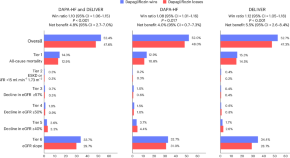
The efficacy of dapagliflozin in a hierarchical kidney outcome in heart failure
Dapagliflozin improved a hierarchical composite outcome, including death, a worsening kidney disease event, and estimated glomerular filtration rate slope, compared with placebo, in patients with heart failure. This hierarchical outcome — analyzed with win statistics — might provide the statistical power to evaluate the effect of treatments on kidney function in heart failure trials.
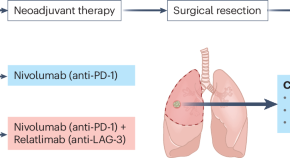
Refining neoadjuvant immunotherapy for resectable lung cancer
In an era of expanding perioperative approaches for resectable non–small-cell lung cancer, new data demonstrate that dual neoadjuvant immunotherapy targeting PD-1 and LAG-3 is feasible; future analyses may enhance patient selection by identifying immune signatures predictive of response.
- Misty D. Shields
- Christine M. Lovly
Related Subjects
- Drug development
- Epidemiology
- Experimental models of disease
- Genetics research
- Outcomes research
- Paediatric research
- Preclinical research
- Stem-cell research
- Clinical trial design
- Translational research
Latest Research and Reviews
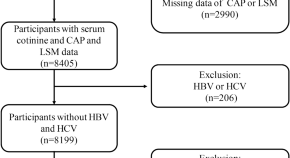
Association between serum cotinine and hepatic steatosis and liver fibrosis in adolescent: a population-based study in the United States
- Shangming Jiang
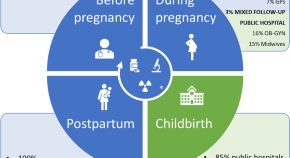
The challenge of adopting a collaborative information system for independent healthcare workers in France: a comprehensive study
- Laurent Gaucher
- Céline Puill
- Frédéric Mougeot
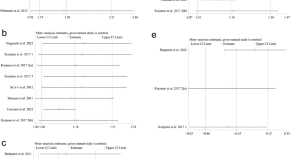
Immediate and delayed placement of the intrauterine device after abortion: a systematic review and meta-analysis
- Shanshan Tang
- Xuejing Jin
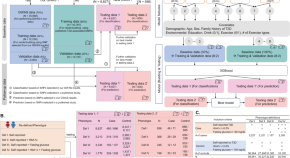
AI-enhanced integration of genetic and medical imaging data for risk assessment of Type 2 diabetes
Type 2 diabetes is a global health threat demanding precise healthcare methods. Here, the authors show that their AI-driven risk assessment models, integrating genetic, imaging, and demographic data, achieve high accuracy in identifying high-risk groups, promising advancements in prevention strategies.
- Yi-Jia Huang
- Chun-houh Chen
- Hsin-Chou Yang
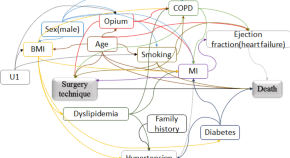
Comparison of outcomes between off-pump and on-pump coronary artery bypass graft surgery using collaborative targeted maximum likelihood estimation
- Hossein Ali Adineh
- Kaveh Hoseini
- Mohammad Ali Mansournia
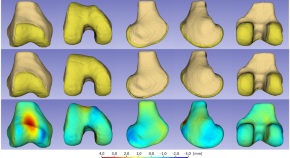
Three-dimensional magnetic resonance imaging-based statistical shape analysis and machine learning-based prediction of patellofemoral instability
- Keita Nagawa
- Kaiji Inoue
- Mamoru Niitsu
News and Comment
The potential and perils of generative artificial intelligence in psychiatry and psychology.
Generative artificial intelligence (AI), exemplified by large language models such as ChatGPT, shows promise in mental health practice, aiding research, training and therapy. However, bias, inaccuracy and trust issues necessitate careful integration with human expertise.
- Arun J. Thirunavukarasu
- Jessica O’Logbon
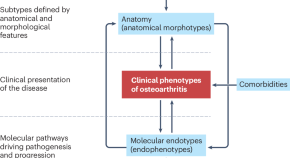
Clinical phenotypes, molecular endotypes and theratypes in OA therapeutic development
Understanding the molecular endotypes that influence clinical phenotypes is a critical step for the stratification of patients with osteoarthritis (OA) into therapeutic subtypes that can help the development of targeted disease-modifying OA drugs (DMOADs) to provide genuine, long-term clinical benefit.
- Ali Mobasheri
- Richard Loeser

Pig-organ transplants: what three human recipients have taught scientists
As researchers mark the loss of the first living recipient of a pig kidney, they share what they’ve learnt about xenotransplantation.
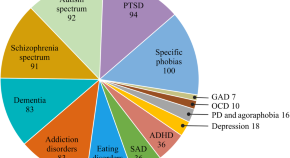
Clinical adoption of virtual reality in mental health is challenged by lack of high-quality research
Virtual reality has been found effective for some mental disorders, while for many others weak methodology prevents conclusive evidence. Similar to other digital technologies, the field has particular demands for conducting clinical research which currently remain poorly addressed. In this commentary, we discuss the unique issues associated with the incorporation of virtual reality in clinical research. In addition, we elaborate on the possibility that these challenges may also be consequences of current funding and publication schemes, and speculate on specific improvement approaches that might be more compatible with the characteristics of clinical virtual reality research.
- Benjamin Selaskowski
- Annika Wiebe
- Niclas Braun

Gut microbes linked to fatty diet drive tumour growth
Scientists know there is a link between obesity and some cancers. A study in mice and people suggests why that might be.
- Gillian Dohrn
Quick links
- Explore articles by subject
- Guide to authors
- Editorial policies

MARK H. EBELL, MD, MS, AND ROLAND GRAD, MD, MSc
June 8, 2020 Editor's Note: The hypertension study (reference 5) is under investigation by the editor of the journal in which it was published due to inconsistencies in the data noted by others. Caution is warranted regarding applying these findings to clinical care.
Am Fam Physician. 2020;101(10):608-617
Author disclosure: Dr. Ebell is cofounder and editor-in-chief of Essential Evidence Plus. See Editor's Note . Dr. Grad has no relevant financial affiliations.
In 2019, regular surveillance of 110 English-language research journals identified 254 studies that met the criteria to become POEMs (patient-oriented evidence that matters). Physician members of the Canadian Medical Association rated these POEMs for their relevance to patients in their practices. This article summarizes the clinical questions and bottom-line answers from the top 20 POEMs of 2019. Taking blood pressure medications at night results in a large mortality reduction over six years compared with morning dosing. Automated devices are the best way to measure blood pressure. Nonfasting lipid profiles are preferred over fasting lipid profiles, and nonfasting and fasting lipid profiles are equally effective at predicting risk. The benefit of statins for primary prevention in people 75 years and older is uncertain at best. Aspirin has no net benefit for primary prevention of cardiovascular disease and has no effect on cancer outcomes. An Italian study found fecal immunochemical testing over five biennial screening cycles has a similar colorectal cancer yield as screening colonoscopy, whereas a meta-analysis found that taking aspirin, an anticoagulant, or a nonsteroidal anti-inflammatory drug has no impact on the positive predictive value of fecal immunochemical testing. Regarding infections, a meta-analysis showed that patients presenting with symptoms of acute respiratory tract infection are unlikely to have pneumonia if vital signs and the lung examination findings are normal. For streptococcal pharyngitis (strep throat), penicillin V at a dosage of 800 mg four times a day for five days is at least as effective as a dosage of 1,000 mg three times a day for 10 days. A primary care study in the United Kingdom reinforced that clinicians should counsel parents of children with lower respiratory tract symptoms to be patient, because these infections can take three weeks or more to fully resolve. Among direct oral anticoagulants, apixaban has the lowest bleeding risk, and cotreating with a proton pump inhibitor significantly reduces bleeding risk. Single ibuprofen doses from 400 to 800 mg significantly reduce acute pain to a similar degree. The two-dose recombinant zoster vaccine is much more effective than the single-dose live, attenuated vaccine but with a greater risk of injection site pain. Exercise helps reduce the risk of falls in older adults. Practice guidelines from 2019 on antithrombotics for atrial fibrillation, the management of type 2 diabetes mellitus, and screening for breast cancer were judged to be especially relevant.
Every year for the past 21 years, a team of experts in evidence-based medicine have systematically reviewed more than 110 English-language research journals to identify the original research most likely to change and improve primary care practice. The team includes experts in family medicine, pharmacology, hospital medicine, and women's health. 1 , 2
The goal of this process is to identify POEMs (patient-oriented evidence that matters). A POEM must report at least one patient-oriented outcome, such as improvement in symptoms, morbidity, or mortality. It should also be free of important methodologic bias, making the results valid and trustworthy. Finally, if applied in practice, the results would change what some family physicians do in patient care by prompting them to adopt a beneficial new practice or discontinue one that is ineffective or harmful. This should improve patient outcomes. Of more than 20,000 research studies published in 2019 in the journals reviewed by the POEMs team, 254 met criteria for validity, relevance, and practice change.
The Canadian Medical Association (CMA) purchases a subscription to POEMs for its members, many of whom receive the daily POEM by email. When members read a POEM, they can rate it with a validated questionnaire called the Information Assessment Method. POEM ratings address the domains of clinical relevance, cognitive impact, use in practice, and expected health benefits if that POEM were to be applied in patient care. 3 , 4 In 2019, each of the 254 POEMs were rated by an average of 1,530 physicians.
In this article, we present the 20 POEMs rated highest for clinical relevance by CMA members in 2019. This installment of our annual series ( https://www.aafp.org/afp/toppoems ) summarizes the clinical question and bottom-line answer for each research study identified as a top 20 POEM, organized by topic and followed by a brief discussion. We also present the three most relevant practice guidelines identified by CMA members. The full text of the POEMs in this article are available at https://www.aafp.org/journals/afp/content/top-poems/2019.html .
Hypertension
Hypertension is among the most common conditions managed by primary care physicians and is the topic of the two POEMs rated most relevant to readers in 2019 ( Table 1 ) . 5 , 6 Researchers randomized 19,168 adults with hypertension to take their antihypertensive medications at bedtime or first thing in the morning. 5 Patients were prescribed an antihypertensive from an approved list of the most common therapies. Patients taking their medications at bedtime had a lower likelihood of the composite outcome of myocardial infarction (MI), coronary revascularization, heart failure, stroke, or cardiovascular death (hazard ratio = 0.55; 95% CI, 0.50 to 0.61; number needed to treat to prevent one event over 6.3 years = 20). All-cause mortality was reduced to a similar extent. This is a large effect for a six-year study, and a practice-changer for many patients and physicians. Best of all, it costs nothing to make this change. See Editor's Note
How we measure blood pressure continues to be a subject of research. The next POEM was a meta-analysis of 31 studies, which included a total of 9,279 patients and compared automated in-office blood pressure readings with in-office manual measurements or ambulatory automated recordings during waking hours (the reference standard). 6 Automated in-office measurements were performed without anyone present to activate the machine and used three to five readings separated by one- to two-minutes. Ambulatory automated measurements were 13.4/5.9 mm Hg lower than the manual in-office measurements and were similar to the in-office automated measurements. To avoid starting or intensifying antihypertensive medication unnecessarily, it is critical to measure blood pressure using an automated device. Patients should also bring in their home device so that it can be calibrated with the office device.
Behavioral Medicine
Behavioral medicine POEMs are summarized in Table 2 . 7 – 9 The first POEM in this group was a well-executed network meta-analysis of medical therapy for generalized anxiety disorder. 7 A network meta-analysis includes studies comparing drugs with each other and with placebo, allowing for direct and indirect comparisons. The meta-analysis included 89 studies involving 25,000 patients and 22 different drugs; none of the studies were longer than 26 weeks. After excluding drugs that were poorly tolerated such as quetiapine (Seroquel), paroxetine (Paxil), and benzodiazepines, the most effective commercially available drugs overall were, in order of effectiveness, bupropion (Wellbutrin), duloxetine (Cymbalta), mirtazapine (Remeron), hydroxyzine, sertraline (Zoloft), pregabalin (Lyrica), venlafaxine, escitalopram (Lexapro), fluoxetine (Prozac), buspirone (Buspar), and citalopram (Celexa). Drugs that did not significantly decrease anxiety scores included imipramine, maprotiline, opipramol (not available in the United States), tiagabine (Gabitril), vilazodone (Viibryd), and vortioxetine (Trintellix). The drugs with the best combination of effectiveness and tolerability were duloxetine, pregabalin, venlafaxine, and escitalopram.
The next POEM included videotaped encounters between 252 patients and 15 English primary care physicians. 8 Patients were asked about the main reason for their visit beforehand, and this reason was almost always addressed during the visit. However, of the 139 patients who identified at least one symptom in the previsit interview, 43 failed to disclose a total of 67 symptoms during the visit, most often stress, worries or sadness; tiredness or sleep problems; problems passing urine; headache; and intimate or other personal problems. Although physicians cannot ask every patient about all of their problems during a visit, it is important to know that patients may not fully disclose symptoms. Physicians should make patients feel as safe as possible while looking for cues to undisclosed symptoms, and routinely asking, “Is there anything else I can help you with?”
The last POEM in the behavioral medicine group was an individual patient data meta-analysis of how early treatment response impacts later outcomes in patients with depression. 9 The researchers combined the individual patient data from 30 randomized trials, with 2,184 patients receiving placebo and 6,058 receiving active therapy. After six weeks of treatment, about 50% of patients in the active treatment group responded to treatment, with 32% achieving remission of symptoms. Response was defined as at least a 50% reduction in the Hamilton Rating Scale for Depression score, and remission was defined as a score of 7 points or less. By 12 weeks, the response rate was 68% in the active treatment group, with 49% achieving remission. Patients with improvement at two weeks were more likely to respond by six weeks, whereas among patients without early improvement, 33% responded by six weeks and 43% by 12 weeks. The absence of an early response does not preclude later response; therefore, physicians should not be too quick to change antidepressant medications.
Cardiovascular
Cardiovascular medicine POEMs are summarized in Table 3 . 10 – 14 The first two POEMs in this group address statin use. Many physicians and laboratory staff continue to insist that patients be fasting for lipid profile testing. The first POEM compared fasting and nonfasting lipid profiles in the same patients four weeks apart. 10 There was little difference between fasting and nonfasting measurements of low-density and high-density lipoprotein cholesterol levels and only a small increase in triglyceride levels (25 mg per dL [0.28 mmol per L]) with nonfasting measurements. Most importantly, the association between lipid levels and subsequent cardiovascular events was identical for fasting and nonfasting lipid measurements. Guidelines support nonfasting lipid measurements. 15 , 16 It is time to simplify our patients' lives and educate local laboratory staff, who often turn away patients who disclose that they are not fasting.
In the next POEM, data were pooled from 28 randomized trials of statins with more than 186,000 total patients. 11 This report focused on the 14,000 patients who were 75 years or older; the median follow-up was five years. There was only a small reduction in the composite outcome of MI and cardiovascular death among all patients (2.6% with statins vs. 3.0% with placebo; number needed to treat = 250 per year); the benefit was significant only in patients with preexisting cardiovascular disease. Statins had no effect on revascularization, stroke, cancer incidence, or cancer mortality.
This was a big year for aspirin studies. The next three POEMs, from two separate trials, examine the benefits and harms of aspirin therapy for primary prevention in contemporary populations. Prior studies that found a net benefit of aspirin for the primary prevention of cardiovascular disease and cancer (mostly colorectal) all recruited patients before 2002. In more recent years, fewer patients smoke or have uncontrolled hypertension, more are taking a statin, and we have widespread colorectal cancer screening. In this context, does aspirin still have a role?
Two aspirin POEMs were from the ASPREE (Aspirin in Reducing Events in the Elderly) trial, which included 19,114 adults 70 years and older in the United States and Australia (65 and older if black or Hispanic). Patients without known cardiovascular disease were randomized to aspirin, 100 mg, or placebo and were followed for a median of 4.7 years. The first POEM found no significant reduction in the likelihood of cardiovascular disease with aspirin, including fatal cardiovascular disease, fatal or nonfatal MI, and fatal or nonfatal ischemic stroke. However, they found a significant increase in major hemorrhages with aspirin. 12 The second POEM from the ASPREE trial found no difference between groups for disability-free survival, defined as a composite of death, dementia, or persistent physical disability. 13 A separate report from the ASPREE investigators (not one of the top 20 POEMs) found an increase in all-cause mortality with aspirin, primarily due to a significant increase in cancer-specific mortality (3.1% vs. 2.3%).
The third aspirin POEM was from the ASCEND (A Study of Cardiovascular Events in Diabetes) trial and included 15,480 adults 40 years and older with diabetes mellitus but no known cardiovascular disease. The patients were randomized to aspirin, 100 mg, or placebo and were followed for a median of 7.4 years. 14 There was a reduction in the composite of nonfatal MI, nonfatal stroke, or cardiovascular death with aspirin, but a corresponding increase in major hemorrhage with no effect on cardiovascular or all-cause mortality.
What do we tell our patients? A recent meta-analysis compared trials of aspirin therapy that recruited patients from 1978 to 2002 with four large trials that recruited patients since 2005. 17 The newer studies showed fewer cardiovascular benefits and no reduction in cancer incidence or mortality with aspirin as primary prevention. Based on a meta-analysis of the four most recent studies with a total of 61,604 patients, for every 1,200 patients taking aspirin instead of placebo for five years, there would be four fewer major cardiovascular events and three fewer ischemic strokes but eight more major hemorrhages, including three more intracranial hemorrhages. This study agrees with recent European guidelines that no longer recommend aspirin for primary prevention. 18 The 2016 U.S. Preventive Services Task Force (USPSTF) and 2019 American College of Cardiology guidelines recommend consideration of aspirin for primary prevention only in selected patients at high cardiovascular risk and low bleeding risk. 19 , 20 The USPSTF recommendation is currently being updated. 21
Cancer Screening
The three POEMs on cancer screening ( Table 4 ) address colorectal cancer. 22 – 24 Fecal immunochemical testing (FIT) is the recommended method for colorectal cancer screening in most countries that have screening programs and is the subject of the first two POEMs in this group. The first POEM is an Italian study that reported the diagnostic yield of five rounds of biennial FIT in persons 50 to 69 years of age submitting a single specimen. 22 The highest rates of detection occurred in the first round, as prevalent cancers were detected, and declined and then stabilized in later rounds. Over the 10-year study, about 25% of men and 18% of women had a positive test result requiring a follow-up colonoscopy. The cumulative rate was 6% for advanced adenoma and 0.85% for colorectal cancer, which are similar to findings in studies of colonoscopy in Italy and the United States. 25 , 26 These results mean we can have confidence in FIT as a screening test while we wait for the results of ongoing randomized trials of FIT vs. colonoscopy-based screening.
The second POEM about FIT was a meta-analysis evaluating the impact of aspirin, nonsteroidal anti-inflammatory drugs, and anticoagulants on the positive predictive value of the test. 23 It could theoretically go in either direction, increasing false positives by making noncancerous lesions more likely to bleed or increasing true positives by making cancers and adenomas more likely to bleed. The researchers found that the use of any of these medications had almost no effect on the positive predictive value, which was approximately 6% for colorectal cancer and 40% for advanced neoplasia. FIT requires only a single specimen and no dietary preparation, and now we know that patients undergoing FIT can continue to take medications that increase bleeding risk.
Finally, a study used a Swedish cancer registry with 173,796 patients to determine the impact of family history on the risk of colorectal cancer. 24 The relative risk of colorectal cancer using no affected relatives as the reference was 1.2 for a single second-degree relative with a history of colorectal cancer, 1.6 for a single first-degree relative or two second-degree relatives, 2.3 for one first-degree relative and one second-degree relative, 2.5 for two first-degree relatives, and 5.4 for one first-degree and two second-degree relatives. However, a previous study found that this family history–related risk is attenuated once patients reach 55 years of age. 27
POEMs on managing infections are summarized in Table 5 . 28 – 30 The first POEM is a meta-analysis of studies that recruited outpatients with acute respiratory tract infections who received chest radiography. 28 The goal was to identify the best sign, symptom, or combination that allows clinicians to rule out community-acquired pneumonia (CAP). The researchers found that for patients with the combination of normal vital signs and normal lung examination findings, the likelihood of CAP is low at 0.4%. This could help reduce unnecessary chest radiography if applied consistently.
The second POEM in this group was selected as one of the top three research studies out of more than 400 presented at the 2019 North American Primary Care Research Group meeting. 29 This Swedish study included 422 adults and children presenting to a primary care physician with moderately severe streptococcal pharyngitis (strep throat). Patients were randomized to penicillin V at a dosage of 800 mg four times a day for five days or 1,000 mg three times a day for 10 days. Those receiving the higher dose over a shorter course of treatment had similar cure rates as those receiving longer-duration therapy, with quicker symptom resolution and no increase in recurrence. Many other studies have found similar results with antibiotics for a range of infections.
An accurate prognosis can potentially help patients avoid unnecessary antibiotic use and return visits. The third POEM in this group recruited 485 healthy children in the United Kingdom, and parents were instructed to contact the researchers every time the child had a respiratory tract infection. 30 One-half of the children had at least one infection, with a median duration of nine days; 90% recovered by day 23. Lower respiratory tract infections were associated with a longer duration of symptoms and ear infections were associated with a shorter duration. This reinforces that clinicians should counsel parents of children with lower respiratory tract symptoms to be patient.
Miscellaneous
Four additional POEMs are summarized in Table 6 . 31 – 34 The first is a cohort study of more than 1.6 million Medicare beneficiaries who started an anticoagulant between 2011 and 2015. 31 Bleeding rates were compared, adjusting for available covariates using propensity score matching (i.e., matching patients who were similar other than choice of anticoagulant). The adjusted incidence of hospitalization for upper gastrointestinal tract bleeding was significantly higher in those who received rivaroxaban (Xarelto) compared with those who received dabigatran (Pradaxa), warfarin (Coumadin), or apixaban (Eliquis); 144 per 10,000 person-years vs. 120, 113, and 73, respectively). For all agents combined, adding a proton pump inhibitor significantly reduced bleeding risk (76 out of 10,000 per year vs. 115 out of 10,000 per year; number needed to treat = 256), although rivaroxaban still had the highest bleeding rate.
The next POEM identified 225 adults presenting to the emergency department with acute pain (mostly musculoskeletal); the average pain score was 6 to 7 out of 10. 32 They were then randomized to a single dose of 400-mg, 600-mg, or 800-mg ibuprofen. An hour after taking the medication, there was no difference between groups, which all had pain scores between 4.4 and 4.5.
The third POEM in this group is a meta-analysis of studies comparing two doses of the recombinant zoster vaccine (Shingrix) with one dose of the live, attenuated vaccine (Zostavax) for the prevention of shingles. 33 Shingrix was more effective but caused more systemic adverse events, although mild, and more injection site pain.
Finally, a systematic review identified 46 studies of the impact of exercise on fall risk in patients 59 years or older. 34 Most of the programs used moderate-intensity exercise, with about one hour of exercise three times per week. The researchers found that exercise significantly decreased the overall risk of falls and resulting injuries but did not affect the risk of multiple falls, hospitalization, or mortality. Fractures were less likely in the exercise group but not significantly.
Practice Guidelines
POEMs sometimes summarize high-impact practice guidelines from important organizations. Key messages from the three highest-rated guidelines are summarized in Table 7 . 35 – 37
The American College of Chest Physicians recommends initiating direct oral anticoagulant therapy in patients with newly diagnosed atrial fibrillation, avoiding aspirin or aspirin plus clopidogrel (Plavix) to prevent thromboembolism, using risk scores for stroke and bleeding, and avoiding cotreatment with aspirin and an anticoagulant if possible. 35
The American Diabetes Association/European Association for the Study of Diabetes guideline for type 2 diabetes mellitus continues to recommend educating patients about diabetes self-management and providing support as the cornerstone of therapy, and metformin as the preferred initial therapy. 36 If a second agent is needed, there are many options, although glucagon-like peptide 1 receptor antagonists or sodium-glucose cotransporter 2 inhibitors are recommended for patients with established heart disease; sodium-glucose cotransporter 2 inhibitors are preferred for patients with heart failure or chronic kidney disease.
The American College of Physicians recommendations for breast cancer screening generally parallel those of the USPSTF, which are supported by the American Academy of Family Physicians. Recommendations include shared decision-making in women 40 to 49 years of age, biennial mammography from 50 to 74 years of age or until the woman's life expectancy is less than 10 years, and eliminating the clinical breast examination as a screening test for women who undergo regular mammography. 37 – 39
The full text of the POEMs discussed in this article is available at https://www.aafp.org/journals/afp/content/top-poems/2019.html .
A list of top POEMs from previous years is available at https://www.aafp.org/afp/toppoems .
Editor's Note: This article was cowritten by Dr. Mark Ebell, who is deputy editor for evidence-based medicine for AFP and cofounder and editor-in-chief of Essential Evidence Plus, published by Wiley-Blackwell, Inc. Because of Dr. Ebell's dual roles and ties to Essential Evidence Plus, the concept for this article was independently reviewed and approved by a group of AFP 's medical editors. In addition, the article underwent peer review and editing by three of AFP 's medical editors. Dr. Ebell was not involved in the editorial decision-making process.—Sumi Sexton, MD, Editor-in-Chief.
The authors thank Wiley-Blackwell, Inc., for giving permission to excerpt the POEMs; Drs. Allen Shaughnessy, Henry Barry, David Slawson, Nita Kulkarni, and Linda Speer for their work in selecting and writing the original POEMs; the academic family medicine fellows and faculty of the University of Missouri–Columbia for their work as peer reviewers; Pierre Pluye, PhD, for his work in codeveloping the Information Assessment Method; and Maria Vlasak for her assistance with copyediting the POEMs for the past 26 years.
Shaughnessy AF, Slawson DC, Bennett JH. Becoming an information master: a guidebook to the medical information jungle. J Fam Pract. 1994;39(5):489-499.
Ebell MH, Barry HC, Slawson DC, et al. Finding POEMs in the medical literature. J Fam Pract. 1999;48(5):350-355.
Grad RM, Pluye P, Mercer J, et al. Impact of research-based synopses delivered as daily e-mail: a prospective observational study. J Am Med Inform Assoc. 2008;15(2):240-245.
Pluye P, Grad RM, Johnson-Lafleur J, et al. Evaluation of email alerts in practice: Part 2. Validation of the information assessment method. J Eval Clin Pract. 2010;16(6):1236-1243.
- Hermida RC, Crespo JJ, Domínguez-Sardiña M, et al. Bedtime hypertension treatment improves cardiovascular risk reduction: the Hygia Chronotherapy Trial [published online October 22, 2019]. Eur Heart J . 2019. Accessed March 10, 2020. https://academic.oup.com/eurheartj/advance-article/doi/10.1093/eurheartj/ehz754/5602478
Roerecke M, Kaczorowski J, Myers MG. Comparing automated office blood pressure readings with other methods of blood pressure measurement for identifying patients with possible hypertension. A systematic review and meta-analysis. JAMA Intern Med. 2019;179(3):351-362.
Slee A, Nazareth I, Bondaronek P, et al. Pharmacological treatments for generalised anxiety disorder [published correction appears in Lancet . 2019;393(10182):1698]. Lancet. 2019;393(10173):768-777.
Paskins Z, Sanders T, Croft PR, et al. Non-disclosure of symptoms in primary care: an observational study. Fam Pract. 2018;35(6):706-711.
de Vries YA, Roest AM, Bos EH, et al. Predicting antidepressant response by monitoring early improvement of individual symptoms of depression: individual patient data meta-analysis. Br J Psychiatry. 2019;214(1):4-10.
Mora S, Chang CL, Moorthy MV, et al. Association of nonfasting vs fasting lipid levels with risk of major coronary events in the Anglo-Scandinavian Cardiac Outcomes Trial–lipid lowering arm. JAMA Intern Med. 2019;179(7):898-905.
Cholesterol Treatment Trialists' Collaboration. Efficacy and safety of statin therapy in older people: a meta-analysis of individual participant data from 28 randomised controlled trials. Lancet. 2019;393(10170):407-415.
McNeil JJ, Wolfe R, Woods RL, et al.; ASPREE Investigator Group. Effect of aspirin on cardiovascular events and bleeding in the healthy elderly. N Engl J Med. 2018;379(16):1509-1518.
McNeil JJ, Woods RL, Nelson MR, et al.; ASPREE Investigator Group. Effect of aspirin on disability-free survival in the healthy elderly. N Engl J Med. 2018;379(16):1499-1508.
Bowman L, Mafham M, Wallendszus K, et al.; ASCEND Study Collaborative Group. Effects of aspirin for primary prevention in persons with diabetes mellitus. N Engl J Med. 2018;379(16):1529-1539.
Nordestgaard BG, Langsted A, Mora S, et al. Fasting is not routinely required for determination of a lipid profile—a joint consensus statement from the European Atherosclerosis Society and European Federation of Clinical Chemistry and Laboratory Medicine. Eur Heart J. 2016;37(25):1944-1958.
Grundy SM, Stone NJ. 2018 cholesterol clinical practice guidelines: Synopsis of the 2018 American Heart Association/American College of Cardiology/Multisociety cholesterol guideline. Ann Intern Med. 2019;170(11):779-783.
Moriarty F, Ebell MH. A comparison of contemporary versus older studies of aspirin for primary prevention [published online November 21, 2019]. Fam Pract . 2019. Accessed March 10, 2020. https://academic.oup.com/fampra/advance-article/doi/10.1093/fampra/cmz080/5637484
Piepoli MF, Hoes AW, Agewall S, et al.; The Sixth Joint Task Force of the European Society of Cardiology and Other Societies on Cardiovascular Disease Prevention in Clinical Practice. 2016 European Guidelines on cardiovascular disease prevention in clinical practice. Eur Heart J. 2016;37(29):2315-2381.
Arnett DK, Blumenthal RS, Albert MA, et al. 2019 ACC/AHA guideline on the primary prevention of cardiovascular disease: a report of the American College of Cardiology/American Heart Association Task Force on Clinical Practice Guidelines [published correction appears in J Am Coll Cardiol . 2019;74(10):1429–1430]. J Am Coll Cardiol. 2019;74(10):e177-e232.
Bibbins-Domingo K. Aspirin Use for the Primary Prevention of Cardiovascular Disease and Colorectal Cancer: U.S. Preventive Services Task Force Recommendation Statement. Ann Intern Med. 2016;164(12):836-845.
U.S. Preventive Services Task Force. Aspirin use to prevent cardiovascular disease and colorectal cancer: preventive medication. April 2016. Accessed February 14, 2010. https://bit.ly/343LnT6
Zorzi M, Hassan C, Capodaglio G, et al. Long-term performance of colorectal cancer screening programmes based on the faecal immunochemical test. Gut. 2018;67(12):2124-2130.
Nieuwenburg SAV, Vuik FER, Kruip MJHA, et al. Effect of anticoagulants and NSAIDs on accuracy of faecal immunochemical tests (FITs) in colorectal cancer screening: a systematic review and meta-analysis. Gut. 2019;68(5):866-872.
Tian Y, Kharazmi E, Sundquist K, et al. Familial colorectal cancer risk in half siblings and siblings: nationwide cohort study. BMJ. 2019;364:l803.
Imperiale TF, Ransohoff DF, Itzkowitz SH, et al. Multitarget stool DNA testing for colorectal-cancer screening. N Engl J Med. 2014;370(14):1287-1297.
Segnan N, Senore C, Andreoni B, et al. Comparing attendance and detection rate of colonoscopy with sigmoidoscopy and FIT for colorectal cancer screening. Gastroenterology. 2007;132(7):2304-2312.
Schoen RE, Razzak A, Yu KJ, et al. Incidence and mortality of colorectal cancer in individuals with a family history of colorectal cancer. Gastroenterology. 2015;149(6):1438-1445.e1.
Marchello CS, Ebell MH, Dale AP, et al. Signs and symptoms that rule out community-acquired pneumonia in outpatient adults: a systematic review and meta-analysis. J Am Board Fam Med. 2019;32(2):234-247.
Skoog Ståhlgren G, Tyrstrup M, Edlund C, et al. Penicillin V four times daily for five days versus three times daily for 10 days in patients with pharyngotonsillitis caused by group A streptococci: randomised controlled, open label, non-inferiority study. BMJ. 2019;367:l5337.
Hay AD, Anderson E, Ingle S, et al. Respiratory tract infections in children in the community: prospective online inception cohort study. Ann Fam Med. 2019;17(1):14-22.
Ray WA, Chung CP, Murray KT, et al. Association of oral anticoagulants and proton pump inhibitor cotherapy with hospitalization for upper gastrointestinal tract bleeding. JAMA. 2018;320(21):2221-2230.
Motov S, Masoudi A, Drapkin J, et al. Comparison of oral ibuprofen at three single-dose regimens for treating acute pain in the emergency department: a randomized controlled trial. Ann Emerg Med. 2019;74(4):530-537.
Tricco AC, Zarin W, Cardoso R, et al. Efficacy, effectiveness, and safety of herpes zoster vaccines in adults aged 50 and older: systematic review and network meta-analysis. BMJ. 2018;363:k4029.
de Souto Barreto P, Rolland Y, Vellas B, et al. Association of long-term exercise training with risk of falls, fractures, hospitalizations, and mortality in older adults. A systematic review and meta-analysis. JAMA Intern Med. 2019;179(3):394-405.
Lip GYH, Banerjee A, Boriani G, et al. Antithrombotic therapy for atrial fibrillation: CHEST guideline and expert panel report. Chest. 2018;154(5):1121-1201.
Davies MJ, D'Alessio DA, Fradkin J, et al. Management of hyperglycemia in type 2 diabetes, 2018. A consensus report by the American Diabetes Association (ADA) and the European Association for the Study of Diabetes (EASD). Diabetes Care. 2018;41(12):2669-2701.
Qaseem A, Lin JS, Mustafa RA, et al. Screening for breast cancer in average-risk women: a guidance statement from the American College of Physicians. Ann Intern Med. 2019;170(8):547-560.
U.S. Preventive Services Task Force. Breast cancer: screening. January 2016. Accessed February 14, 2020. https://bit.ly/2ykUZwU
American Academy of Family Physicians. Clinical preventive service recommendation. Breast cancer. Accessed February 14, 2020. https://www.aafp.org/patient-care/clinical-recommendations/all/breast-cancer.html
Continue Reading

More in AFP
More in pubmed.
Copyright © 2020 by the American Academy of Family Physicians.
This content is owned by the AAFP. A person viewing it online may make one printout of the material and may use that printout only for his or her personal, non-commercial reference. This material may not otherwise be downloaded, copied, printed, stored, transmitted or reproduced in any medium, whether now known or later invented, except as authorized in writing by the AAFP. See permissions for copyright questions and/or permission requests.
Copyright © 2024 American Academy of Family Physicians. All Rights Reserved.
- U.S. Department of Health & Human Services

- Virtual Tour
- Staff Directory
- En Español
You are here
Nih research matters.
December 22, 2021
2021 Research Highlights — Promising Medical Findings
Results with potential for enhancing human health.
With NIH support, scientists across the United States and around the world conduct wide-ranging research to discover ways to enhance health, lengthen life, and reduce illness and disability. Groundbreaking NIH-funded research often receives top scientific honors. In 2021, these honors included Nobel Prizes to five NIH-supported scientists . Here’s just a small sample of the NIH-supported research accomplishments in 2021.
Printer-friendly version of full 2021 NIH Research Highlights
20210615-covid.jpg

Advancing COVID-19 treatment and prevention
Amid the sustained pandemic, researchers continued to develop new drugs and vaccines for COVID-19. They found oral drugs that could inhibit virus replication in hamsters and shut down a key enzyme that the virus needs to replicate. Both drugs are currently in clinical trials. Another drug effectively treated both SARS-CoV-2 and RSV, another serious respiratory virus, in animals. Other researchers used an airway-on-a-chip to screen approved drugs for use against COVID-19. These studies identified oral drugs that could be administered outside of clinical settings. Such drugs could become powerful tools for fighting the ongoing pandemic. Also in development are an intranasal vaccine , which could help prevent virus transmission, and vaccines that can protect against a range of coronaviruses .
202211214-alz.jpg

Developments in Alzheimer’s disease research
One of the hallmarks of Alzheimer’s is an abnormal buildup of amyloid-beta protein. A study in mice suggests that antibody therapies targeting amyloid-beta protein could be more effective after enhancing the brain’s waste drainage system . In another study, irisin, an exercise-induced hormone, was found to improve cognitive performance in mice . New approaches also found two approved drugs (described below) with promise for treating AD. These findings point to potential strategies for treating Alzheimer’s. Meanwhile, researchers found that people who slept six hours or less per night in their 50s and 60s were more likely to develop dementia later in life, suggesting that inadequate sleep duration could increase dementia risk.
20211109-retinal.jpg

New uses for old drugs
Developing new drugs can be costly, and the odds of success can be slim. So, some researchers have turned to repurposing drugs that are already approved for other conditions. Scientists found that two FDA-approved drugs were associated with lower rates of Alzheimer’s disease. One is used for high blood pressure and swelling. The other is FDA-approved to treat erectile dysfunction and pulmonary hypertension. Meanwhile, the antidepressant fluoxetine was associated with reduced risk of age-related macular degeneration. Clinical trials will be needed to confirm these drugs’ effects.
20210713-heart.jpg
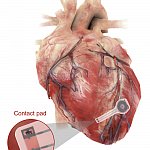
Making a wireless, biodegradable pacemaker
Pacemakers are a vital part of medical care for many people with heart rhythm disorders. Temporary pacemakers currently use wires connected to a power source outside the body. Researchers developed a temporary pacemaker that is powered wirelessly. It also breaks down harmlessly in the body after use. Studies showed that the device can generate enough power to pace a human heart without causing damage or inflammation.
20210330-crohns.jpg

Fungi may impair wound healing in Crohn’s disease
Inflammatory bowel disease develops when immune cells in the gut overreact to a perceived threat to the body. It’s thought that the microbiome plays a role in this process. Researchers found that a fungus called Debaryomyces hansenii impaired gut wound healing in mice and was also found in damaged gut tissue in people with Crohn’s disease, a type of inflammatory bowel disease. Blocking this microbe might encourage tissue repair in Crohn’s disease.
20210406-flu.jpg

Nanoparticle-based flu vaccine
Influenza, or flu, kills an estimated 290,000-650,000 people each year worldwide. The flu virus changes, or mutates, quickly. A single vaccine that conferred protection against a wide variety of strains would provide a major boost to global health. Researchers developed a nanoparticle-based vaccine that protected against a broad range of flu virus strains in animals. The vaccine may prevent flu more effectively than current seasonal vaccines. Researchers are planning a Phase 1 clinical trial to test the vaccine in people.
20211002-lyme.jpg

A targeted antibiotic for treating Lyme disease
Lyme disease cases are becoming more frequent and widespread. Current treatment entails the use of broad-spectrum antibiotics. But these drugs can damage the patient’s gut microbiome and select for resistance in non-target bacteria. Researchers found that a neglected antibiotic called hygromycin A selectively kills the bacteria that cause Lyme disease. The antibiotic was able to treat Lyme disease in mice without disrupting the microbiome and could make an attractive therapeutic candidate.
20211102-back.jpg

Retraining the brain to treat chronic pain
More than 25 million people in the U.S. live with chronic pain. After a treatment called pain reprocessing therapy, two-thirds of people with mild or moderate chronic back pain for which no physical cause could be found were mostly or completely pain-free. The findings suggest that people can learn to reduce the brain activity causing some types of chronic pain that occur in the absence of injury or persist after healing.
2021 Research Highlights — Basic Research Insights >>
Connect with Us
- More Social Media from NIH
An official website of the United States government
The .gov means it’s official. Federal government websites often end in .gov or .mil. Before sharing sensitive information, make sure you’re on a federal government site.
The site is secure. The https:// ensures that you are connecting to the official website and that any information you provide is encrypted and transmitted securely.
- Publications
- Account settings
Preview improvements coming to the PMC website in October 2024. Learn More or Try it out now .
- Advanced Search
- Journal List
- Eur Heart J

Hot topics and trends in cardiovascular research
1 Department of Cardiovascular Sciences, KU Leuven, Campus Gasthuisberg O/N1 704, Herestraat 49, Leuven, Belgium
2 ECOOM, Department of Managerial Economics, Strategy and Innovation, KU Leuven, Naamsestraat 61, Leuven, Belgium
Wolfgang Glänzel
3 Department Science Policy & Scientometrics, Library of the Hungarian Academy of Sciences, Arany János u. 1, Budapest, Hungary
Karin R Sipido
Associated data.
Comprehensive data on research undertaken in cardiovascular medicine can inform the scientific community and can support policy building. We used the publication output from 2004 to 2013 and the 2014 references to these documents, to identify research topics and trends in the field of cardiovascular disease.
Methods and results
Text fragments were extracted from the titles and abstracts of 478 000 publications using natural language processing. Through machine-learning algorithms, these text fragments combined to identify specific topics across all publications. A second method, which included cross-references, assigned each publication document to a specific cluster. Experts named the topics and document clusters based on various outputs from these semi-automatic methods. We identified and labelled 175 cardiovascular topics and 20 large document clusters, with concordance between the approaches. Overarching, strongly growing topics in clinical and population sciences are evidence-based guidance for treatment, research on outcomes, prognosis, and risk factors. ‘Hot’ topics include novel treatments in valve disease and in coronary artery disease, and imaging. Basic research decreases its share over time but sees substantial growth of research on stem cells and tissue engineering, as well as in translational research. Inflammation, biomarkers, metabolic syndrome, obesity, and lipids are hot topics across population, clinical and basic research, supporting integration across the cardiovascular field.
Growth in clinical and population research emphasizes improving patient outcomes through novel treatments, risk stratification, and prevention. Translation and innovation redefine basic research in cardiovascular disease. Medical need, funding and publishing policies, and scientific opportunities are potential drivers for these evolutions.
Introduction
Current policies for public funding of health research increasingly focus on innovation, with a final goal to improve health outcomes. 1 To support policies, roadmaps are established, for example for diabetes 2 and respiratory 3 diseases. In the USA, the joint Academies developed a document to guide national policy in health 4 with a dedicated document for cardiovascular medicine 5 that includes general directions for research. In Europe, building a roadmap for cardiovascular research is one of the tasks of the ERA-CVD network. 6 Expert opinion guides the exercise but a macro and global-level overview of past cardiovascular research can enrich the debate and strengthen the basis for recommendations. The breadth of cardiovascular research is astounding, 7 with research undertaken across a variety of institutions and with each piece of research having its own scope/focus or topic. It is thus challenging to review and summarize all the research that has been undertaken.
Identifying all the relevant research is the first hurdle to overcome, then classifying or identifying topics of research is the next significant hurdle. Journal classification systems offer little assistance, as they are not granular enough to identify more specific topics within broader fields. Thesauri or medical dictionaries, such as PubMed or the International Classification of Diseases (ICD), do not offer an overview of time-dependent changes in topics or changing concepts.
Identifying key topics using semi-automatic approaches based on text analysis is an alternative solution that takes advantage of recent developments in high-level informatics. As this is not reliant on a predefined classification, it may result in different outcomes. Various methods use natural language processing (NLP) to extract topics or clusters from text. For example, the bibliometric community has compared the results when varying methods are applied to a set of astronomy publications, focusing on the importance having topic expert input throughout the process. 8 The recent CardioScape project analysed abstracts of 2476 research projects awarded 2010–12 as published by funding bodies. The authors assigned research project to topics, based on the abstract text, using a semi-automatic process that tested and trained the data to more quickly allocate abstracts to a topic than depending solely on expert review. They produced a detailed taxonomy or classification of cardiovascular research based on the list of topics of the European Society of Cardiology, creating a hierarchical list of over 600 topics. 9
Here, we aim to identify topics in published cardiovascular research and their evolution between 2004 and 2013, assessing whether they have appeared, disappeared, or changed over time. In a comprehensive approach, we use a combination of existing methods for text mining, network analysis, and clustering, and further develop these tools to handle a large dataset of >400 000 publications.
In our study, we use two different and complementary approaches. A first one detects topics across the collection of publications, counting number of documents, and relations between topics. A second one maps document networks into clusters with an identifiable subject of research. These approaches are described here in brief, with more detail provided in the Supplementary material online .
Data sources
The dataset includes the reference, abstract, address, and citation data for 478 006 cardiovascular publications from 2004 to 2013, including 2014 references to these documents, using an expert informed search strategy and references to core cardiovascular journals, as previously published. 7 The documents span across >5000 journals, and include cardiovascular publications in leading general journals in medical and life sciences ( Supplementary material online , Table S1 ). We obtained the data from Clarivate Analytics Web of Science Core Collection (WoS) through a custom data license held by ECOOM, KU Leuven.
Text pre-processing
We took all titles and abstracts of the above publications, and extracted the noun phrases (text fragments of various lengths) using the NLP framework developed at Stanford. 10 Supplementary material online , Figure S1 illustrates the subsequent data flow for the analysis.
Topic modelling
For this approach, we applied latent Dirichlet allocation (LDA) 11 to the above-mentioned text fragments from the titles and abstracts of all publications. This LDA approach groups the text fragments to identify topics and allocates documents to topics. In this approach, a document contributes to several topics. Of note, general terms or terms that are used frequently across the majority of documents are filtered out as part of the methodology, resulting in groups of highly specific text fragments and, consequently, topics, as illustrated in Supplementary material online , Figure S2 .
At least three cardiovascular experts (listed in the Acknowledgements section) named each topic based on a set of the top 40 text fragments representing a topic. Further rounds of cross-review validated and consolidated the naming process. A final review of all topics ensured naming consistency across the topics and allowed for additional expert-based classification as clinical, basic, or population research.
We then calculated the number of documents that contributed to a topic, using probability analysis in LDA. Furthermore, we calculated the co-occurrence of topics in the publications, and visualized the outcome of this network analysis using VOSViewer ( www.vosviewer.com ). 12
Document clustering
For this second approach, the dataset was reduced to two periods, and we analysed the cardiovascular publications from 2006 to 2008 and those from 2011 to 2013, separately. For each time period, we then calculated the similarities between documents based on the noun phrase text fragments from the titles and abstracts of all publications and based on the references in these publications, using adapted cosine calculations and a hybrid document clustering algorithm, as previously described. 13 We then applied the Louvain 14 community detection algorithm to identify clusters of similar documents. For this method, each document is only located in one cluster. Subsequently, we applied the DrL/OpenOrd algorithm 15 to map and visualize the documents and clusters. We used R 16 in a high-powered cloud-based parallelized computing environment for all operations.
We identified and described the core documents, 13 the most common text fragments, as well as, the most highly cited documents and the most productive authors in each cluster, to name the clusters. For each document cluster, we identified the most highly representative topics from the LDA topic model.
Evolution of cardiovascular topics—trends and ‘hot’ topics
We identified 175 topics, listed alphabetically in Supplementary material online , Table S2 . This list groups specific topics within areas such as atherosclerosis, coronary artery disease, arrhythmias, heart failure, and their evolution over time.
For a visual and comprehensive overview, we prepared a map of the topics and their interrelation, based on co-occurrence within publications using a network analysis ( Figure Figure1 1 A ). This map identifies different categories of research: population (at the top, blue), clinical (left, green/yellow), and basic research (right, red). Large topics in each category define overarching interests such as Evidence-guided-treatment and Outcomes and prognosis in clinical research, and Epidemiology of CVD and risk factors in population research, topics that have seen large growth in numbers of publications since 2004 ( Figure Figure1 1 B ). Cell signalling and gene transcription is a central topic for basic research, with modest growth ( Figure Figure1 1 B ).

Main areas and organization of research focus. ( A ) Visual presentation of the topics in 2013 and how they relate to each other, based on how often the topics are included in the same publication. Each circle represents one topic and each group of topics is highlighted in a separate colour; the most similar documents and clusters are located closer to each other based on VOSviewer mapping. ( B ) Evolution of overarching topics.
More focused ‘hot’ topics that experienced a large growth in number of publications are presented in Figure 2 .

Topics with large growth. For population research, the eight topics that increased more than two-fold in volume are shown; for clinical research, 27 topics increased more than two-fold and 10 of these are presented; for basic research only two topics had more than a two-fold increase, and the top 8 growers are presented. Overarching topics are shown in Figure Figure1 1 B .
In population research, risk factors with research on metabolic syndrome, lipids, diabetes, physical activity, and mental health are prominent. In clinical research, patient management after myocardial infarction (MI) and outside the hospital are leading topics, but the true ‘hot’ topic was aortic valve disease that saw a surge of interest, related to transaortic valve repair, starting 2008. Though still small in numbers, heart failure research and stem cells saw substantial growth. This last clinical topic complements the major hot topics in basic research, on stem cells and cardiac repair and tissue engineering. In basic research, increasing translational output in metabolic syndrome and diabetes use mostly mouse models. Focused topics are organelle studies on mitochondria and endoplasmic reticulum.
Table 1 complements the fast growing topics of Figure 2 with additional leading 2013 topics. Most of these also have grown since 2004, but two topics, even if large, seem to have lost momentum, i.e. longitudinal studies on blood pressure, and basic research in cardiac electrophysiology.
Large topics in 2013
PCOS, polycystic ovary syndrome.
Only four topics in clinical, and none in population research, saw a decrease, whereas seven topics in basic research saw a decline in output ( Figure Figure3 3 A ). Across all topics, the growth in publication output, measured as the number of documents in 2013 divided by the number of documents in 2004, was significantly larger in clinical and population research topics than in basic research topics ( Figure Figure3 3 B ).

Unequal growth of research output across categories. ( A ) Topics that saw a decrease of >5%, i.e. 4/102 clinical and 7/50 basic research topics. ( B ) Average growth in each category. Each dot presents a topic; the values are the fractional growth, i.e. the number of documents in 2013 divided by the number of documents in 2004. Kruskal–Wallis followed by Dunn’s test for multiple comparisons; *** P < 0.0001 basic vs. clinical and vs. population.
When considering the overall output and growth of publications across the categories of population, clinical and basic research, the data suggest that the share of basic research publications is declining.
Document clusters define large research areas and trends
The size of topics represents the activity within each of these—documents contribute to more than one topic. In a complementary approach, we examined how documents group together based on the similarity of their text and of their references, whereby each document can belong to one cluster only, effectively dividing the total publication output into different areas. The hybrid clustering algorithm was applied to two datasets, i.e. the publications from 2006 to 2008 and 2011 to 2013.
In each period, 10 large clusters emerged, accounting for >90% of all documents.
To identify trends, we compare the two periods and examine the evolution over time ( Figure 4 ). In the graph legends, emerging areas are marked by green triangle, decreasing ones with a red triangle. Risk scoring in the population and related patient management are the leading areas, growing over time (top position). In 2011–13, a large cluster emerges that relates to gene and stem-cell therapy, including research on inducible pluripotent stem cells. Documents within this cluster include research on ischaemic heart disease and arrhythmias. Haemodynamics and biomechanics are another emerging area that includes documents on atherosclerosis and vascular diseases such as aneurysms, but also heart failure and assist devices. Aortic valve disease is a newly defined area in 2011–13. Imaging also becomes very prominent as an area in its own right. Whereas in 2006–08, hypertension was a defined area, this is no longer identifiable in 2011–13.

Distribution of document clusters in 2006–08 and in 2011–13. ( A ) In 2006–08, the 10 largest clusters represent 93% of the total publication output in this period. ( B ) In 2011–13, the 10 largest clusters represent 92% of the total publication output in this period. The colour codes for similar clusters are maintained across the periods. However, some clusters are present in only one period. The clusters are arranged by size, reading clockwise from the top, and the legends arranged accordingly. Red triangles mark clusters that disappeared and green triangles emerging clusters.
For the last period, we also examined the structure and interrelation of clusters, using a graphical rendering, giving insight in the size, composition, and presence of subclusters ( Figure 5 ).

Document clusters’ map 2011–13. A visual presentation of documents in clusters and subclusters: the most similar documents and clusters are located closer to each other, based on the DrL two-dimensional mapping layout technique.
In this force-directed DrL graph layout, the documents and clusters are mapped to minimize the distance between the most similar documents and maximize the distance between non-linked documents. This produces a two-dimensional co-ordinate layout where the documents closest to each other share the most similarities since they share common text fragments and references. Conversely, documents and clusters on the edges of the graph have the least similarity to other documents or clusters.
Cluster 2 on gene and stem cells is dense and separate, yet touches and interacts with Cluster 5 [acute coronary syndrome (ACS) and MI]. Cluster 9 on imaging is spread out in subclusters at different locations, including one near Cluster 5 (ACS and MI), and one near Cluster 4 (heart failure). Cluster 8 (arrhythmias) is also split with one part closer to heart failure, another to anticoagulation and atrial fibrillation.
Further naming the subclusters is presently beyond reach, as it would require a lot of expert input and resources. However, linking the clusters and the topics adds granularity to the larger research areas and provides internal methodological validation of the cluster naming.
Table 2 presents the most highly associated topics in the ten largest document clusters in each period. Overall, agreement with the LDA topics is high and provides more detail on the research contained in the clusters. E.g., the cluster ‘Haemodynamics’ is now showing different areas of focus, i.e. in congenital disease, aortic, and valvular diseases; the topic ‘Arrhythmias’ is more populated with device research in the second time period compared to the first.
Cluster names and topics present within clusters
AF, atrial fibrillation; ANS, autonomic nervous system; BP, blood pressure; CABG, coronary artery bypass grafting; CRT, cardiac resynchronization therapy; CT, computed tomography; CV, cardiovascular; DES, drug-eluting stent; ECG, electrocardiogram; HF, heart failure; LV, left ventricular; NOAC, new oral anticoagulant; PTCI, percutaneous transluminal coronary intervention; RV, right ventricle; STEMI, ST elevated myocardial infarction.
The method for identification of topics in cardiovascular publication output allowed the visualization and evaluation of trends in cardiovascular research. Over a 10-year period significant shifts occur.
Identification of cardiovascular research topics through natural language processing
In cardiovascular research, topics are generally predefined in a taxonomy that can be hierarchical and/or matrix structured. The CardioScape project approach (see Introduction section) was well suited to its purpose of the analysis of 2476 project abstracts in a single time period and using an existing taxonomy has the advantage of recognizable areas of research. The bottom-up approach used here lent itself well to analysis of much larger numbers of documents and generated a topic list that represents the interests from the community during the period under study.
A recent study by the WHO working to identify cardiovascular disease research output from random sets of publications from PubMed required a significant amount of expert-based review of only a small proportion of the published articles. 17 The current approach was more comprehensive in coverage of the field, but despite reliance on advanced automated analysis, experts still had an important role in interpreting and linking concepts to validate the results.
In the current naming of topics and clusters, experts frequently used terms that connect to a classic hierarchical list in the field, including major diseases, and recognizing clinical, population, and basic discovery research. Nevertheless, the approach uncovered specific emerging areas of research such as transcatheter aortic valve implantation (TAVI), topics consistent with broad trends, such as risk stratification and evidence-based guidance, and innovation (gene and stem cell research). Some of these terms would not appear in a classic taxonomy and thus the NLP approach offers novel insights.
The present study was not attempting to classify all research but to capture and identify the most common and evolving topics over time in the cardiovascular field by using a comprehensive set of cardiovascular publications across some 5000 journals.
Emphasis on improving clinical care and risk assessment
The most represented and fast growing topics across the documents are evidence-based guidance for treatment and research on outcomes and prognosis. These result underscore the attention given to guidelines and evidence based medicine (EBM). 18–23 Part of this research is likely to represent the large number of clinical trials taking place in the cardiovascular field, 24 which over time have had a significant effect on the reduction of mortality from CVD due to establishing the effectiveness and safety of a number of drugs and medical interventions in cardiovascular disease. 25 The presence of policy related topics, such as the topics on quality of care and health economics likewise supports the focus on implementation research and a shift of focus from reducing acute mortality to care in chronic disease.
Growth of research on risk factors emphasizes the importance of preventative medicine, evident in both the topics analysis and the document cluster analysis. However, some specific blood pressure studies declined over time, perhaps reflecting the change in focus on the single risk factor of ‘blood pressure’ to a multivariable spectrum and newly identified risk factors. We have also previously shown that hypertension has moved more closely to clinical cardiovascular research over time. 26
Smaller topics illustrate crosstalk with non-cardiovascular diseases, because of shared risk factors or common methods used in research or occurrence of cardiovascular complications. The latter is particularly evident in two topics that focus on cardiovascular complications in pregnancy and in cancer.
Innovation and translation in clinical and basic science
Major diseases such as ischaemic heart disease and arrhythmias, remain present over time but shifts can be seen. There is for example, a larger focus on atrial fibrillation, in particular embolic risk, on novel treatments, such as stem cells in heart failure, and transcatheter aortic valve interventions as a dominant element within the topic of valvular heart disease. 19 Imaging is present in several topics but emerges as a cluster in its own right in the document analysis. Many of these changes are driven by technological innovation and translation.
Basic research as a whole saw its share decline, but with interesting shifts in content. Although the topic analysis and mapping identifies basic research topics as a category, there are complementarities across categories. Stem cell research, tissue engineering, and biomechanical factors saw rapid growth and are also present in clinical topics. This also applies to inflammation and diabetes. Animal models for disease are rapidly growing topics consistent with growth of translational research.
An analysis of the countries of authorship of the publications in the emerging clusters of discovery research shows that the USA leads in the number and share of publications (30%+), followed mostly by Germany, or the UK or Italy. However, for the large document cluster on genes and stem cells in 2011–13, the second most productive country is China, contributing 17.5% of the publications in this cluster (Supplementary material online, Figure S3 ).
Interestingly, inflammation, biomarkers, metabolic syndrome, obesity, and lipids are hot topics with growing research output in population, clinical and basic research, indicating integration and crosstalk across the spectrum of cardiovascular research.
Drivers of change
Technology and opportunity-driven scientific interest, but also strategic choices and funding policies are likely to influence trends in research. CardioScape studied public and charity funding in the years 2010–12 and describes major investments in clinical research. Yet the share of publication output globally for clinical research appears to be substantially larger than the share of funding for clinical research reported in CardioScape. This could be explained by clinical research funded by other sources, such as industry or local funding, which are not included in the CardioScape analysis. Also, the present data represent global output. Major research investments in China, and the emphasis on clinical research in the USA, can contribute to some of the global trends.
The slower growth in basic science could reflect a slower growth in investment. This can be absolute or relative towards the increasing costs of advanced research methodology. Another reason could be editorial pressure for more comprehensive papers that may reduce quantity to the benefit of rich content in individual papers.
Finally, growing translational research may blur the boundaries between basic and clinical research and lead to an apparent slower growth in discovery research.
Policy perspectives
Policy development is a forward looking exercise. In health research, medical needs identified by health data and expert opinion, are an important consideration. 27 Past research output helps to identify areas that may need more investment. Research funders also use input from society. 28 When assessing current priorities in cardiovascular research for the Dutch 28 and British 29 Heart Foundations we can see that research into heart failure and arrhythmias are common across their top priorities. Focus on healthy lifestyles is a top priority in the Dutch Heart Foundation as well as in the US vision and strategic agenda. 4 , 5 At the macro-level, the data presented here indicate that some of the main issues presented in these research agendas are actively pursued but others less so.
Study limitations
Limitations of studying research topics have been addressed in the bibliometric field. 8 The reliance of expert input is a limitation and potential source of bias that we tried to minimize by using mixed panels.
The current approach was not sufficiently granular to extract recent emerging topics that contain a limited number of documents. In addition, publication output is somewhat delayed vs. actual research and experts may be aware of ongoing research with still limited output. In this case, the method and dataset can be used to interrogate about specific developments (see Supplementary material online , Table S3 for data on micro-RNA and personalized medicine).
As the data set ends in 2013, very recent developments are not covered. This relates to the methodological complexity. Web of Science data including 2014 references were available mid-2015, the cardiovascular publications dataset was complete in 2016 and algorithms for analysis including re-iterative expert review required another 18 months. A similar time lag is seen in other studies that rely on data mining and processing. 9 Congress abstracts could be considered as a source to identify emerging topics but have several limitations. They are of a different nature than papers and the scope of a congress shapes content of selected abstracts. We provide a complementary survey of 3000 abstracts from the 2018 congress of the European Society of Cardiology, illustrating the strong presence of clinical research at this event, within the topics of Clusters 1 and 3–7 of Table 2 ( Supplementary material online , Figure S4 ). Two emerging topics were cardio-oncology and digital health, each representing however <25 abstracts.
In the present analysis, quality and impact of studies in a particular domain were not evaluated, though highly cited papers were part of the cluster identification. In their analysis of poorly cited papers covering 165 000 papers in 1997–2008, Ranasinghe et al . 30 noted the highest percentage of poorly cited papers in the clinical and population research category. Nevertheless, as they and others 31 have noted, citations are not the only parameter to assess impact, in particular in clinical medicine.
Conclusions
Identification of leading research topics and trends illustrates the emphasis on improving clinical medicine, and the growing interest in risk stratification and preventive medicine. Translation and innovation redefine cardiovascular research. Linking the present data with the insights of the professional community and of funders and society, may contribute to the building of a future research roadmap.
Supplementary Material
Ehz282_supplementary_data, acknowledgements.
The authors thank to the following experts for their review of the text fragments and input into the names of the topics: Dr Matthew Amoni, Dr Peter Haemers, Prof Sian Harding, Dr Frederik Helsen, Prof Gerd Heusch, Prof Tatiana Kuznetsova, Prof Tobias Op‘t Hof, Prof Frank Rademakers, Dr Sander Trenson, Dr Bert Vandenberk, and Dr Maarten Vanhaverbeke.
D.G. had a PhD Fellowship through KU Leuven.
Conflict of interest: K.R.S. is Past Editor-in-Chief of Cardiovascular Research (2013–17). W.G. is Editor-in-Chief of Scientometrics .
Research Topics & Ideas: Healthcare
100+ Healthcare Research Topic Ideas To Fast-Track Your Project

Finding and choosing a strong research topic is the critical first step when it comes to crafting a high-quality dissertation, thesis or research project. If you’ve landed on this post, chances are you’re looking for a healthcare-related research topic , but aren’t sure where to start. Here, we’ll explore a variety of healthcare-related research ideas and topic thought-starters across a range of healthcare fields, including allopathic and alternative medicine, dentistry, physical therapy, optometry, pharmacology and public health.
NB – This is just the start…
The topic ideation and evaluation process has multiple steps . In this post, we’ll kickstart the process by sharing some research topic ideas within the healthcare domain. This is the starting point, but to develop a well-defined research topic, you’ll need to identify a clear and convincing research gap , along with a well-justified plan of action to fill that gap.
If you’re new to the oftentimes perplexing world of research, or if this is your first time undertaking a formal academic research project, be sure to check out our free dissertation mini-course. In it, we cover the process of writing a dissertation or thesis from start to end. Be sure to also sign up for our free webinar that explores how to find a high-quality research topic.
Overview: Healthcare Research Topics
- Allopathic medicine
- Alternative /complementary medicine
- Veterinary medicine
- Physical therapy/ rehab
- Optometry and ophthalmology
- Pharmacy and pharmacology
- Public health
- Examples of healthcare-related dissertations
Allopathic (Conventional) Medicine
- The effectiveness of telemedicine in remote elderly patient care
- The impact of stress on the immune system of cancer patients
- The effects of a plant-based diet on chronic diseases such as diabetes
- The use of AI in early cancer diagnosis and treatment
- The role of the gut microbiome in mental health conditions such as depression and anxiety
- The efficacy of mindfulness meditation in reducing chronic pain: A systematic review
- The benefits and drawbacks of electronic health records in a developing country
- The effects of environmental pollution on breast milk quality
- The use of personalized medicine in treating genetic disorders
- The impact of social determinants of health on chronic diseases in Asia
- The role of high-intensity interval training in improving cardiovascular health
- The efficacy of using probiotics for gut health in pregnant women
- The impact of poor sleep on the treatment of chronic illnesses
- The role of inflammation in the development of chronic diseases such as lupus
- The effectiveness of physiotherapy in pain control post-surgery

Topics & Ideas: Alternative Medicine
- The benefits of herbal medicine in treating young asthma patients
- The use of acupuncture in treating infertility in women over 40 years of age
- The effectiveness of homoeopathy in treating mental health disorders: A systematic review
- The role of aromatherapy in reducing stress and anxiety post-surgery
- The impact of mindfulness meditation on reducing high blood pressure
- The use of chiropractic therapy in treating back pain of pregnant women
- The efficacy of traditional Chinese medicine such as Shun-Qi-Tong-Xie (SQTX) in treating digestive disorders in China
- The impact of yoga on physical and mental health in adolescents
- The benefits of hydrotherapy in treating musculoskeletal disorders such as tendinitis
- The role of Reiki in promoting healing and relaxation post birth
- The effectiveness of naturopathy in treating skin conditions such as eczema
- The use of deep tissue massage therapy in reducing chronic pain in amputees
- The impact of tai chi on the treatment of anxiety and depression
- The benefits of reflexology in treating stress, anxiety and chronic fatigue
- The role of acupuncture in the prophylactic management of headaches and migraines

Topics & Ideas: Dentistry
- The impact of sugar consumption on the oral health of infants
- The use of digital dentistry in improving patient care: A systematic review
- The efficacy of orthodontic treatments in correcting bite problems in adults
- The role of dental hygiene in preventing gum disease in patients with dental bridges
- The impact of smoking on oral health and tobacco cessation support from UK dentists
- The benefits of dental implants in restoring missing teeth in adolescents
- The use of lasers in dental procedures such as root canals
- The efficacy of root canal treatment using high-frequency electric pulses in saving infected teeth
- The role of fluoride in promoting remineralization and slowing down demineralization
- The impact of stress-induced reflux on oral health
- The benefits of dental crowns in restoring damaged teeth in elderly patients
- The use of sedation dentistry in managing dental anxiety in children
- The efficacy of teeth whitening treatments in improving dental aesthetics in patients with braces
- The role of orthodontic appliances in improving well-being
- The impact of periodontal disease on overall health and chronic illnesses

Tops & Ideas: Veterinary Medicine
- The impact of nutrition on broiler chicken production
- The role of vaccines in disease prevention in horses
- The importance of parasite control in animal health in piggeries
- The impact of animal behaviour on welfare in the dairy industry
- The effects of environmental pollution on the health of cattle
- The role of veterinary technology such as MRI in animal care
- The importance of pain management in post-surgery health outcomes
- The impact of genetics on animal health and disease in layer chickens
- The effectiveness of alternative therapies in veterinary medicine: A systematic review
- The role of veterinary medicine in public health: A case study of the COVID-19 pandemic
- The impact of climate change on animal health and infectious diseases in animals
- The importance of animal welfare in veterinary medicine and sustainable agriculture
- The effects of the human-animal bond on canine health
- The role of veterinary medicine in conservation efforts: A case study of Rhinoceros poaching in Africa
- The impact of veterinary research of new vaccines on animal health
Topics & Ideas: Physical Therapy/Rehab
- The efficacy of aquatic therapy in improving joint mobility and strength in polio patients
- The impact of telerehabilitation on patient outcomes in Germany
- The effect of kinesiotaping on reducing knee pain and improving function in individuals with chronic pain
- A comparison of manual therapy and yoga exercise therapy in the management of low back pain
- The use of wearable technology in physical rehabilitation and the impact on patient adherence to a rehabilitation plan
- The impact of mindfulness-based interventions in physical therapy in adolescents
- The effects of resistance training on individuals with Parkinson’s disease
- The role of hydrotherapy in the management of fibromyalgia
- The impact of cognitive-behavioural therapy in physical rehabilitation for individuals with chronic pain
- The use of virtual reality in physical rehabilitation of sports injuries
- The effects of electrical stimulation on muscle function and strength in athletes
- The role of physical therapy in the management of stroke recovery: A systematic review
- The impact of pilates on mental health in individuals with depression
- The use of thermal modalities in physical therapy and its effectiveness in reducing pain and inflammation
- The effect of strength training on balance and gait in elderly patients
Topics & Ideas: Optometry & Opthalmology
- The impact of screen time on the vision and ocular health of children under the age of 5
- The effects of blue light exposure from digital devices on ocular health
- The role of dietary interventions, such as the intake of whole grains, in the management of age-related macular degeneration
- The use of telemedicine in optometry and ophthalmology in the UK
- The impact of myopia control interventions on African American children’s vision
- The use of contact lenses in the management of dry eye syndrome: different treatment options
- The effects of visual rehabilitation in individuals with traumatic brain injury
- The role of low vision rehabilitation in individuals with age-related vision loss: challenges and solutions
- The impact of environmental air pollution on ocular health
- The effectiveness of orthokeratology in myopia control compared to contact lenses
- The role of dietary supplements, such as omega-3 fatty acids, in ocular health
- The effects of ultraviolet radiation exposure from tanning beds on ocular health
- The impact of computer vision syndrome on long-term visual function
- The use of novel diagnostic tools in optometry and ophthalmology in developing countries
- The effects of virtual reality on visual perception and ocular health: an examination of dry eye syndrome and neurologic symptoms
Topics & Ideas: Pharmacy & Pharmacology
- The impact of medication adherence on patient outcomes in cystic fibrosis
- The use of personalized medicine in the management of chronic diseases such as Alzheimer’s disease
- The effects of pharmacogenomics on drug response and toxicity in cancer patients
- The role of pharmacists in the management of chronic pain in primary care
- The impact of drug-drug interactions on patient mental health outcomes
- The use of telepharmacy in healthcare: Present status and future potential
- The effects of herbal and dietary supplements on drug efficacy and toxicity
- The role of pharmacists in the management of type 1 diabetes
- The impact of medication errors on patient outcomes and satisfaction
- The use of technology in medication management in the USA
- The effects of smoking on drug metabolism and pharmacokinetics: A case study of clozapine
- Leveraging the role of pharmacists in preventing and managing opioid use disorder
- The impact of the opioid epidemic on public health in a developing country
- The use of biosimilars in the management of the skin condition psoriasis
- The effects of the Affordable Care Act on medication utilization and patient outcomes in African Americans
Topics & Ideas: Public Health
- The impact of the built environment and urbanisation on physical activity and obesity
- The effects of food insecurity on health outcomes in Zimbabwe
- The role of community-based participatory research in addressing health disparities
- The impact of social determinants of health, such as racism, on population health
- The effects of heat waves on public health
- The role of telehealth in addressing healthcare access and equity in South America
- The impact of gun violence on public health in South Africa
- The effects of chlorofluorocarbons air pollution on respiratory health
- The role of public health interventions in reducing health disparities in the USA
- The impact of the United States Affordable Care Act on access to healthcare and health outcomes
- The effects of water insecurity on health outcomes in the Middle East
- The role of community health workers in addressing healthcare access and equity in low-income countries
- The impact of mass incarceration on public health and behavioural health of a community
- The effects of floods on public health and healthcare systems
- The role of social media in public health communication and behaviour change in adolescents
Examples: Healthcare Dissertation & Theses
While the ideas we’ve presented above are a decent starting point for finding a healthcare-related research topic, they are fairly generic and non-specific. So, it helps to look at actual dissertations and theses to see how this all comes together.
Below, we’ve included a selection of research projects from various healthcare-related degree programs to help refine your thinking. These are actual dissertations and theses, written as part of Master’s and PhD-level programs, so they can provide some useful insight as to what a research topic looks like in practice.
- Improving Follow-Up Care for Homeless Populations in North County San Diego (Sanchez, 2021)
- On the Incentives of Medicare’s Hospital Reimbursement and an Examination of Exchangeability (Elzinga, 2016)
- Managing the healthcare crisis: the career narratives of nurses (Krueger, 2021)
- Methods for preventing central line-associated bloodstream infection in pediatric haematology-oncology patients: A systematic literature review (Balkan, 2020)
- Farms in Healthcare: Enhancing Knowledge, Sharing, and Collaboration (Garramone, 2019)
- When machine learning meets healthcare: towards knowledge incorporation in multimodal healthcare analytics (Yuan, 2020)
- Integrated behavioural healthcare: The future of rural mental health (Fox, 2019)
- Healthcare service use patterns among autistic adults: A systematic review with narrative synthesis (Gilmore, 2021)
- Mindfulness-Based Interventions: Combatting Burnout and Compassionate Fatigue among Mental Health Caregivers (Lundquist, 2022)
- Transgender and gender-diverse people’s perceptions of gender-inclusive healthcare access and associated hope for the future (Wille, 2021)
- Efficient Neural Network Synthesis and Its Application in Smart Healthcare (Hassantabar, 2022)
- The Experience of Female Veterans and Health-Seeking Behaviors (Switzer, 2022)
- Machine learning applications towards risk prediction and cost forecasting in healthcare (Singh, 2022)
- Does Variation in the Nursing Home Inspection Process Explain Disparity in Regulatory Outcomes? (Fox, 2020)
Looking at these titles, you can probably pick up that the research topics here are quite specific and narrowly-focused , compared to the generic ones presented earlier. This is an important thing to keep in mind as you develop your own research topic. That is to say, to create a top-notch research topic, you must be precise and target a specific context with specific variables of interest . In other words, you need to identify a clear, well-justified research gap.
Need more help?
If you’re still feeling a bit unsure about how to find a research topic for your healthcare dissertation or thesis, check out Topic Kickstarter service below.

You Might Also Like:

15 Comments
I need topics that will match the Msc program am running in healthcare research please
Hello Mabel,
I can help you with a good topic, kindly provide your email let’s have a good discussion on this.
Can you provide some research topics and ideas on Immunology?
Thank you to create new knowledge on research problem verse research topic
Help on problem statement on teen pregnancy
This post might be useful: https://gradcoach.com/research-problem-statement/
can you provide me with a research topic on healthcare related topics to a qqi level 5 student
Please can someone help me with research topics in public health ?
Hello I have requirement of Health related latest research issue/topics for my social media speeches. If possible pls share health issues , diagnosis, treatment.
I would like a topic thought around first-line support for Gender-Based Violence for survivors or one related to prevention of Gender-Based Violence
Please can I be helped with a master’s research topic in either chemical pathology or hematology or immunology? thanks
Can u please provide me with a research topic on occupational health and safety at the health sector
Good day kindly help provide me with Ph.D. Public health topics on Reproductive and Maternal Health, interventional studies on Health Education
may you assist me with a good easy healthcare administration study topic
May you assist me in finding a research topic on nutrition,physical activity and obesity. On the impact on children
Submit a Comment Cancel reply
Your email address will not be published. Required fields are marked *
Save my name, email, and website in this browser for the next time I comment.
- Print Friendly
Research Topics
The links below will take you to the Research pages for all of the Department of Medicine’s different Section and Centers. You can explore more specific research topics within those pages.
Masks Strongly Recommended but Not Required in Maryland, Starting Immediately
Due to the downward trend in respiratory viruses in Maryland, masking is no longer required but remains strongly recommended in Johns Hopkins Medicine clinical locations in Maryland. Read more .
- Vaccines
- Masking Guidelines
- Visitor Guidelines
Research at Johns Hopkins
Research begins in the lab, which is why we prioritize lab facilities that drive discovery and advancement in research.

Meet Our Research Faculty
Our faculty members expand what's possible through biomedical research.

Clinical Trials
Clinical trials provide important research for a wide range of conditions. Find out more about clinical trials at Johns Hopkins Medicine.

Understanding Clinical Trials
At Johns Hopkins Medicine, we believe that clinical research is key to improve care for people in our community and around the world. Once you understand more about clinical research, you may appreciate why it’s important to participate—for yourself and the community.

Research Topics
At the foundation of Johns Hopkins Medicine is research — from basic research, where scientists study cells and mechanisms, to clinical research that builds on those findings using trials, to translational research that takes information learned from trials to the patient bedside.
Latest News
Johns hopkins hospital recognized as million hearts hospital by cdc.
JHH is 7th hospital to receive this national designation for improving cardiovascular health of patients, employees and communities.

Studies Show Social Isolation Is a Risk Factor for Dementia in Older Adults
Two new studies from Johns Hopkins Medicine suggest social isolation is a risk for dementia in older adults. However, basic tech can help.


Explore the Best Medical and Health Research Topics Ideas
Table of contents
- 1 How to Choose Medical Research Paper Topics
- 2 New Medical Research Paper Topics
- 3 Medical Research Topics for College Students
- 4 Controversial Medical Topics for Research Paper
- 5 Health Research Topics
- 6 Medicine Research Topics
- 7 Healthcare Research Topics
- 8 Public Health Research Topics
- 9 Mental Health Research Paper Topics
- 10 Anatomy Research Topics
- 11 Biomedical Research Topics
- 12 Bioethics Research Topics
- 13 Cancer Research Topics
- 14 Clinical Research Topics
- 15 Critical Care Research Topics
- 16 Pediatric Research Topics
- 17 Dental Research Topics Ideas
- 18 Dermatology Research Topics
- 19 Primary Care Research Topics
- 20 Pharmaceutical Research Topics
- 21 Medical Anthropology Research Topics
- 22 Paramedic Research Paper Topics
- 23 Surgery Research Topics
- 24 Radiology Research Paper Topics
- 25 Anatomy and Physiology Research Paper Topics
- 26 Healthcare Management Research Paper Topics
- 27 Medical Ethics Research Paper Topics
- 28 Conclusion
In such a complex and broad field as medicine, writing an original and compelling research paper is a daunting task. From investigating public care concerns to cancer treatment studies, each student decides where his interests lie. Our goal is to help students find new angles to study and focus on relevant topics. With our resources, you can write an engaging and rigorous paper.
How to Choose Medical Research Paper Topics
Choosing good research paper topics is often more challenging than the writing process itself. You need to select a captivating subject matter that will grab the reader’s attention, showcase your knowledge of a specific field, help you progress in your studies, and perhaps even inspire future research.
To accomplish that, you need to start with brainstorming, followed by thorough research. Here are some great tips to follow:
- Pick an interesting topic – The key is to pick something that you find interesting, and yet make sure it’s not too general or too narrow. It should allow you to delve deep into the subject matter and show that you’re a professional who is ready to take on a challenge when it comes to your chosen field of medicine.
- Narrow down your focus – Once you have a list of potential topics, sift through recent medical research papers to get up-to-date with the latest trends, developments, and issues in medicine and healthcare. Check out textbooks, news articles, and other relevant sources for more information related to your potential topics. If a particular condition or disease interests you (perhaps something that drew you to a career in medicine), there’s your cue for narrowing down your topic.
- Pinpoint the “why,” “how,” and “what” – Whether you are looking into nutrition research paper topics , controversial medical topics, nursing research topics, or anything in-between, ask yourself why each of them is important. How could they contribute to the available medical studies, if any? What new information could they bring to improve the future of medicine? Asking these questions will help you pick the right medical research paper topic that suits you and helps you move forward and reach your aspirations.
To help you on that quest, we’ve compiled a list of topics that you could use or that might inspire you to come up with something unique. Let’s dive in.
New Medical Research Paper Topics
Are you interested in the newest and most interesting developments in medicine? We put hours of effort into identifying the current trends in health research so we could provide you with these examples of topics. Whether you hire a research paper writing service for students or write a paper by yourself, you need an appealing topic to focus on.
- Epidemics versus pandemics
- Child health care
- Medical humanitarian missions in the developing world
- Homoeopathic medicines – the placebo effect
- Virus infections – causes and treatment
- Is medical research on animals ethical
- Vaccination – dangers versus benefits
- Artificial tissues and organs
- Rare genetic diseases
- Brain injuries
Medical Research Topics for College Students
You don’t know where to start with your medical research paper? There are so many things you could write about that the greatest challenge is to narrow them down. This is why we decided to help.
- Antibiotics treatments
- Chronic diseases
- Palliative treatment
- Battling Alzheimer’s disease
- How modern lifestyle affects public health
- Professional diseases
- Sleep disorders
- Changes in physical and mental health due to aging
- Eating disorders
- Terminal diseases
Controversial Medical Topics for Research Paper
In healthcare, new discoveries can change people’s lives in the blink of an eye. This is also the reason why there are so many controversial topics in medicine, which involve anything from religion to ethics or social responsibility. Read on to discover our top controversial research topics.
- Implementing food standards
- Gluten allergy
- Assisted suicide for terminal patients
- Testing vaccines on animals – ethical concerns
- Moral responsibilities regarding cloning
- Marijuana legalization for medical purposes
- Abortion – medical approaches
- Vegan diets – benefits and dangers
- Increased life expectancy: a burden on the healthcare system?
- Circumcision effects
Health Research Topics
Students conducting health research struggle with finding good ideas related to their medical interests. If you want to write interesting college papers, you can select a good topic for our list.
- How environmental changes affect human health
- Deafness: communication disorders
- Household air pollution
- Diabetes – a public danger
- Coronaviruses
- Oral health assessment
- Tobacco and alcohol control
- Diseases caused by lack of physical exercise
- How urban pollution affects respiratory diseases
- Healthy diets
Medicine Research Topics
Regardless of the requirements in your research assignment, you can write about something that is both engaging and useful in your future career. Choose a topic from below.
- Causes for the increasing cancer cases
- Insulin resistance
- How terrorism affects mental health
- AIDS/HIV – latest developments
- Treating pregnant women versus non-pregnant women
- Latest innovations in medical instruments
- Genetic engineering
- Successful treatment of mental diseases
- Is autism a disease
- Natural coma versus artificial coma
Healthcare Research Topics
Healthcare research includes political and social aspects, besides medical. For college students who want to explore how medicine is affected by society’s values or principles, we provide examples of topics for papers. Select yours from the list below.
- Government investment in healthcare services in the EU versus the USA
- Inequalities in healthcare assistance and services
- Electronic health records systems – pros and cons
- Can asylums treat mental issues
- Health care for prison inmates
- Equipment for improving treatment of AIDS
- Correlation between economic development and health care services across countries
- Impact of smoking on organs
- Heart attacks – causes and effects
- Breast cancer – recent developments
Public Health Research Topics
For current examples of public health topics, browse our list. We provide only original, researchable examples for which you can easily find supporting data and evidence.
- Public versus private hospitals
- Health care professionals – management principles
- Surgery failures – who is responsible
- What legal responsibilities has the hospital administration
- Patient service quality in public versus private hospitals
- What benefits national health care systems have
- Estimated costs of cancer treatments
- Public health in developing countries
- Banning tobacco ads – importance for public health
- Government solutions to the anti-vaccine’s movement
Mental Health Research Paper Topics
Mental health is one of the most complex areas of medicine, where things are never as clear as with other medical issues. This increases the research potential of the field with plenty of topics left for debate.
- Causes of anxiety disorders
- Bulimia versus anorexia
- Childhood trauma
- Mental health public policies
- Postpartum Depression
- Posttraumatic Stress Disorder
- Seasonal Affective Disorder
- Schizophrenia
Anatomy Research Topics
Anatomy covers everything about the human body and how it works. If you find that intriguing and want to pay for medical research paper, start by selecting a topic.
- Chemotherapy: how it affects the body
- Thyroid glands – functions in the body
- Human endocrine system
- Heart diseases
- How does the human muscular system develop
- Lymphatic system – importance
- Investigating genetic diseases
- Digestive system
Biomedical Research Topics
Biology and medicine often work together. For the newest changes in the biomedical field, check our topics.
- Alzheimer’s disease – paths for treatment
- Vaccines and drug development in the treatment of Ebola
- Antibiotic resistance
- Biological effects caused by aging
- Air pollution effects on health
- Infectious disease past versus present
- Regenerative medicine
- Biomedical diagnostics
- Biomedical technology
Bioethics Research Topics
A controversial area of medicine, bioethics is where you get the chance to add personal input to a research topic and come up with new insights. You could consider these subjects.
- Organ donation
- Alternative or complementary medicine
- Assisted suicide or the right to die
- Artificial insemination or surrogacy
- Chemical and biological warfare
- Contraception
- Environmental bioethics
- In Vitro fertilization
Cancer Research Topics
Are you writing a paper related to cancer causes, diagnosis, treatment or effects? Look below for a hot topic that it’s easy to research and important for medical advance.
- Ability of immune system cells to fight cancer
- Computational oncology
- Metastasis affected by drug resistance
- Stem cells – applications for cancer treatment
- Tumor microenvironment
- Obesity and age in cancer occurrence
- Early cancer detection – benefits
- Artificial intelligence predicting cancer
- Hematologic malignancies
- Pathogen-related cancers
Clinical Research Topics
Learn more about clinical medicine by conducting more in-depth research. We prepared for you a list of relevant issues to touch upon.
- Ethical concerns regarding research on human subjects
- Subject recruitment
- Budget preparation
- Human subject protection
- Clinical trials – financial support
- Clinical practices for health professionals
- Using vulnerable populations in clinical research
- Quality assurance in clinical research
- Academic clinical trials versus clinical trials units
- Data collection and management
Critical Care Research Topics
Critical care is a key area in medical studies. Explore these topics in your research paper to gain more valuable knowledge in this field. You can also get in contact with nursing research paper writers .
- Obesity and asthma – clinical manifestations
- Chronic obstructive pulmonary disease
- Rhythm analysis for cardiac arrest
- Traumatic brain injury – fluid resuscitation
- Hydrocortisone for multiple trauma patients
- Care and nutrition for critically ill adults
- Diagnosis of hypersensitivity pneumonitis
- Coma and sedation scales
- Artificial airways suctioning
- Arterial puncture and arterial line
Pediatric Research Topics
Any topic that refers to health care for children, pregnant women, mothers, and adolescents goes under pediatric care.
- Attention deficit hyperactivity disorder (ADHD)
- Congenital heart disease in newborns
- Adolescent medicine
- Neonatal medicine
- Rare diseases in children and teenagers
- Obesity and weight fluctuations
- Behavioral sleep problems in children
- Children with anemia
Dental Research Topics Ideas
Choose a topic on oral health or dental care from this list of the most interesting topics in the field.
- How smoking affects oral health
- Children’s risk for dental caries
- Dental anxiety
- Types of dental materials – new advances
- Bad breath bacteria
- How diabetes affects oral health
- Oral cancer
- Dental pain – types, causes
- Dental implants
- Oral health-related quality of life
Dermatology Research Topics
Find the best research topic for your dermatology paper among our examples.
- Atopic dermatitis
- Contact dermatitis
- Epidemiology behind uncommon skin disorders
- Cutaneous aging
- Risk factors of melanoma skin cancer
- Acne versus rosacea
- Genetic testing for skin conditions
- Effects of cosmetic agents on skin health
- Improving skin barrier with pharmaceutical agents
- Skin manifestations of autoimmune disorders
Primary Care Research Topics
Write a primary care paper that can demonstrate your research skills and interest in powerful scientific findings.
- Primary care for vulnerable/uninsured populations
- Interpersonal continuity in care treatment
- How primary care contributes to health systems
- Primary care delivery models
- Developments in family medicine
- Occupational/environmental health
- Pharmacotherapy approaches
- Formal allergy testing
- Oral contraception side effects
- Dietary or behavioral interventions for obesity management
Pharmaceutical Research Topics
Pharma students who need paper topics can use one from our list. We include all things related to pharmacy life.
- Drugs that can treat cancer
- Drug excretion
- Elimination rate constant
- Inflammatory stress drug treatment
- Aspirin poising
- Ibuprofen – dangers versus benefits
- Toxicodynamics
- Opioid use disorder
- Pharmacotherapy for schizophrenia
- Ketamine in depression treatment
Medical Anthropology Research Topics
Medical anthropology unites different areas of human knowledge. Find powerful ideas for a paper below.
- Cultural contexts regarding reproductive health
- Women sexuality
- Anthropological aspects of health care
- Contributions of social sciences to public health
- Euthanasia and medical ethics across cultures
- Health-related behavior in adults across cultures
- Transcultural nursing
- Forensic psychiatry
- Symptoms of Celiac Disease – a disease with no symptoms
- Nursing ethics
Paramedic Research Paper Topics
Topics for paramedic research must be based on evidence, data, statistics, or practical experience. Just like ours.
- Trends and statistics in EMS
- Disaster medicine
- Mass casualties
- Pandemics and epidemics
- Infection control
- Basic versus advanced life support
- Scene safety in EMS
- Shock management
- Motor vehicle accidents
Surgery Research Topics
Discover all the intricacies of surgeries that save lives by writing about our topics.
- Medical malpractice and legal issues
- Methicillin-resistant Staphylococcus aureus
- Pain management
- Perioperative nursing
- Wound management
- Colorectal cancer surgery
- Breast cancer surgery
- Minimally invasive surgeries
- Vascular disease
Radiology Research Paper Topics
Find a radiology topic related to your academic interests to write a successful paper.
- Using MRI to diagnose hepatic focal lesions
- Multidetector computer tomography
- Ultrasound elastography in breast cancer
- Assessing traumatic spinal cord injuries with MRI diffusion tensor imaging
- Sonographic imaging to detect male infertility
- Role of tomography in diagnosing cancer
- Brain tumor surgery with magnetic resonance imaging
- Bacterial meningitis imaging
Anatomy and Physiology Research Paper Topics
Any ideas for a medical research paper? We have included the most important topics for an anatomy and physiology paper.
- What role has the endocrine system
- Staphylococcus aureus
- Environmental factors that affect development of human muscular system
- What role has the lymphatic system
- An investigation of genetic diseases
- Explaining the aging process
- The digestive tract
- Effects of stress on cells and muscles
- Evolution of the human nervous system
- What role has the cardiovascular system
Healthcare Management Research Paper Topics
There are numerous topics you could write about when it comes to healthcare management. There’s a wide range of options to pick, from infrastructure, staff, and financial management to HR and patient management. Here are some of the top healthcare management research paper options.
- Medical talent acquisition and retention
- Best methods for enhancing preventative care measures
- The role of telemedicine in reinventing healthcare management
- Patient care and the ability to pay for healthcare
- Mid-level healthcare providers in the emergency department
- The opioid crisis: policies and programs
- Urgent care and walk-in clinics
- Hospital emergency management plan during an epidemic
- Hospital records management and patient privacy
- Financial crises: challenges and opportunities
Medical Ethics Research Paper Topics
Medical ethics is a field that opens the door to numerous compelling topics for research papers. Here are some of the most appealing ones you could tackle.
- Clinical research on humans
- Vaccines and immunization
- Religious beliefs in healthcare
- Euthanasia and physician-assisted suicide
- Ethical issues across cultures
- Amniocentesis or prenatal birth defect testing
- Medical malpractice and going back to work
- Racial and ethnic preferences and perceptions in organ donations
- Racial and ethnic disparities in healthcare
- Ethical concerns of AI in healthcare
If you need further assistance with your medical research paper, PapersOwl is here for you. Our expert writers can provide you with top-notch research and help you write an impressive paper. Contact us anytime, pick your writer, tell them more about your topic, and get a unique, plagiarism-free research paper with impeccable grammar and formatting.
Readers also enjoyed

WHY WAIT? PLACE AN ORDER RIGHT NOW!
Just fill out the form, press the button, and have no worries!
We use cookies to give you the best experience possible. By continuing we’ll assume you board with our cookie policy.
- Privacy Policy

Home » 500+ Medical Research Topic Ideas
500+ Medical Research Topic Ideas
Table of Contents

Medical research plays a crucial role in advancing healthcare and improving human health. It involves the scientific study of various aspects of medicine and health, including the causes, prevention, diagnosis, and treatment of diseases. Medical research is a dynamic and ever-evolving field, with new discoveries and breakthroughs happening all the time. It encompasses a wide range of disciplines, from basic science to clinical research, and involves collaboration between scientists, doctors, and other healthcare professionals. In this article, we will explore some exciting new and latest medical research topic ideas that are currently trending in the field. These Research Topics cover a variety of areas, including genetics, infectious diseases, mental health, and more.
Medical Research Topic Ideas
Medical Research Topic Ideas are as follows:
- The efficacy of mindfulness meditation in reducing symptoms of depression and anxiety
- The effects of vitamin D supplementation on bone health in postmenopausal women
- The impact of social media on body image and eating disorders in adolescents
- The effectiveness of telemedicine in improving access to healthcare in rural communities
- The benefits and risks of long-term use of statins for cholesterol management
- The role of gut microbiota in the development of autoimmune diseases
- The potential of gene therapy for the treatment of genetic disorders
- The relationship between sleep disorders and cardiovascular disease
- The use of artificial intelligence in diagnosing and treating cancer
- The effect of exercise on cognitive function in older adults
- The impact of environmental factors on the development of asthma in children
- The effectiveness of cognitive-behavioral therapy for the treatment of PTSD in veterans
- The potential benefits of psychedelic-assisted therapy for the treatment of mental illness
- The relationship between diet and risk of developing type 2 diabetes
- The role of epigenetics in the development of psychiatric disorders
- The impact of COVID-19 on mental health and well-being
- The effectiveness of mindfulness-based stress reduction in improving quality of life in cancer patients
- The impact of childhood trauma on the development of mental illness in adulthood
- The benefits and risks of hormone replacement therapy for menopausal women
- The effect of music therapy on reducing symptoms of dementia in older adults
- The relationship between gut microbiota and obesity
- The impact of socioeconomic status on health outcomes
- The effectiveness of acupuncture in treating chronic pain
- The use of stem cells in regenerative medicine
- The impact of air pollution on respiratory health
- The potential of nanotechnology in drug delivery
- The relationship between social support and mental health
- The effectiveness of mindfulness-based interventions for addiction treatment
- The role of inflammation in the development of Alzheimer’s disease
- The use of virtual reality in pain management
- The impact of exercise on mental health in adolescents
- The effectiveness of group therapy for the treatment of substance abuse
- The relationship between sleep and weight management
- The benefits and risks of using medical marijuana for chronic pain management
- The role of the immune system in the development of autoimmune diseases
- The effectiveness of cognitive rehabilitation therapy for traumatic brain injury patients
- The impact of maternal stress on fetal development
- The relationship between physical activity and cardiovascular health
- The potential of gene editing for the treatment of genetic disorders
- The effectiveness of mindfulness-based interventions for reducing symptoms of postpartum depression.
- The impact of social media on mental health
- Investigating the use of virtual reality in pain management
- The effectiveness of mindfulness-based interventions for depression
- Exploring the relationship between sleep and anxiety
- Examining the efficacy of telemedicine in delivering mental health care
- Investigating the impact of environmental factors on the development of cancer
- The effect of exercise on cognitive function in elderly individuals
- Examining the potential benefits of psychedelic-assisted therapy for PTSD
- The relationship between diet and cardiovascular disease
- Investigating the impact of air pollution on respiratory health
- Examining the effects of social isolation on mental and physical health
- The use of machine learning in diagnosing medical conditions
- Investigating the effectiveness of acupuncture in pain management
- The impact of childhood trauma on mental and physical health outcomes in adulthood
- Examining the relationship between stress and autoimmune diseases
- The effect of music therapy on mental health outcomes
- Investigating the impact of gender on healthcare outcomes
- Examining the relationship between sleep apnea and cardiovascular disease
- The effectiveness of mindfulness-based interventions for chronic pain
- Investigating the potential benefits of medical marijuana for chronic pain management
- Examining the impact of climate change on infectious disease transmission
- The use of robotics in surgery
- Investigating the relationship between alcohol consumption and cancer risk
- The effect of meditation on blood pressure control
- Examining the impact of social determinants of health on healthcare outcomes
- The role of genetics in the development of mental health conditions
- Investigating the efficacy of cognitive-behavioral therapy for anxiety disorders
- Examining the relationship between inflammation and depression
- The impact of shift work on sleep and circadian rhythms
- Investigating the potential benefits of probiotics in gut health
- Examining the relationship between diet and mental health outcomes
- The effectiveness of art therapy for individuals with dementia
- Investigating the relationship between chronic pain and mental health outcomes
- The impact of artificial intelligence on medical diagnosis and treatment
- Examining the effectiveness of exercise in treating depression
- Investigating the relationship between inflammation and cardiovascular disease
- The effect of aromatherapy on anxiety and stress
- Examining the impact of social support on mental health outcomes
- The effectiveness of hypnotherapy in pain management.
- The role of gut microbiota in immune system modulation
- Effects of intermittent fasting on insulin sensitivity in obese individuals
- Impact of smartphone usage on sleep quality and quantity
- The potential therapeutic effects of CBD on anxiety disorders
- Association between shift work and cardiovascular disease
- Efficacy and safety of psychedelic-assisted psychotherapy in treating depression
- The relationship between stress and autoimmune diseases
- Novel therapies for Alzheimer’s disease
- The effects of high-intensity interval training on metabolic syndrome
- The role of epigenetics in the development of cancer
- The effectiveness of virtual reality in pain management
- The effects of social media on body image and eating disorders
- The association between air pollution and respiratory diseases
- Effects of mindfulness meditation on stress and anxiety in healthcare workers
- The potential benefits of ketogenic diet in treating epilepsy
- The relationship between sleep apnea and cardiovascular disease
- The impact of climate change on infectious disease outbreaks
- The effectiveness of exercise in preventing falls in the elderly
- The effects of blue light exposure on circadian rhythm and sleep quality
- The association between alcohol consumption and liver disease
- The effectiveness of cognitive-behavioral therapy in treating obsessive-compulsive disorder
- The role of gut-brain axis in mental health disorders
- The association between chronic inflammation and cancer
- The efficacy and safety of probiotics in treating irritable bowel syndrome
- The effects of social isolation on mental health in the elderly
- The impact of exercise on cognitive function in Parkinson’s disease patients
- The association between vitamin D deficiency and autoimmune diseases
- The potential therapeutic effects of music therapy in dementia patients
- The effects of second-hand smoke on cardiovascular health
- The association between maternal smoking and infant health outcomes
- The role of microbiome in the development of allergies
- The association between sleep duration and obesity
- The effects of blue light-blocking glasses on sleep quality and quantity
- The potential therapeutic effects of ketamine in treating depression
- The association between gut dysbiosis and inflammatory bowel disease
- The effectiveness of cognitive rehabilitation therapy in traumatic brain injury patients
- The impact of early childhood stress on adult mental health
- The role of inflammation in the development of type 2 diabetes
- The potential benefits of plant-based diets in preventing chronic diseases.
- The effects of exercise on cognitive function in aging adults
- The association between sleep disorders and cardiovascular disease
- The potential therapeutic effects of psilocybin in treating addiction
- The role of gut microbiota in the development of autism spectrum disorder
- The effectiveness of mindfulness-based interventions in treating depression
- The effects of air pollution on cognitive function
- The association between maternal mental health and child development
- The potential therapeutic effects of cannabis in treating chronic pain
- The role of diet in the prevention and management of diabetes
- The effects of social support on mental health in cancer patients
- The association between shift work and mental health disorders
- The efficacy of antiviral therapies in treating COVID-19
- The effects of exercise on bone health in postmenopausal women
- The association between sleep disorders and obesity
- The potential therapeutic effects of mindfulness meditation in treating anxiety disorders
- The role of gut microbiota in the development of metabolic disorders
- The effectiveness of virtual reality therapy in treating phobias
- The association between social support and immune system function
- The impact of early life stress on adult cardiovascular health
- The potential benefits of intermittent fasting in cancer prevention
- The effects of air pollution on pregnancy outcomes
- The association between maternal obesity and child health outcomes
- The efficacy of cognitive-behavioral therapy in treating post-traumatic stress disorder
- The effects of sedentary behavior on metabolic health
- The potential therapeutic effects of omega-3 fatty acids in treating depression
- The role of microbiome in the development of obesity
- The association between social isolation and cognitive decline in older adults
- The impact of environmental toxins on child development
- The potential benefits of plant-based diets in treating metabolic disorders
- The effects of sleep deprivation on cognitive function
- The association between maternal stress and fetal development
- The efficacy of pharmacological interventions in treating anxiety disorders
- The effects of air pollution on respiratory health in children
- The association between social support and cardiovascular health
- The potential therapeutic effects of mindfulness meditation in treating chronic pain
- The role of diet in the prevention and management of cardiovascular disease
- The effects of exercise on mental health in children and adolescents
- The association between social support and cancer survival rates
- The impact of environmental factors on epigenetic modifications and disease susceptibility.
- The effects of exercise on immune function
- The association between maternal obesity and infant health outcomes
- The impact of air pollution on cognitive function in children
- The association between sleep deprivation and mental health disorders
- The effectiveness of virtual reality in rehabilitation after stroke
- The role of the microbiome in the development of obesity
- The impact of noise pollution on cardiovascular health
- The association between depression and cardiovascular disease
- The association between periodontal disease and cardiovascular health
- The impact of social support on mental health outcomes in cancer patients
- The potential therapeutic effects of melatonin in treating sleep disorders
- The association between air pollution and cognitive decline in older adults
- The effectiveness of group therapy in treating social anxiety disorder
- The impact of exercise on bone health in postmenopausal women
- The association between alcohol consumption and breast cancer risk
- The effects of blue light exposure on melatonin secretion and sleep quality
- The potential therapeutic effects of stem cells in treating Parkinson’s disease
- The role of inflammation in the development of depression
- The association between gut dysbiosis and depression
- The effectiveness of music therapy in reducing anxiety in cancer patients
- The impact of social media on mental health in adolescents
- The potential therapeutic effects of ketamine in treating post-traumatic stress disorder
- The association between vitamin D deficiency and cardiovascular disease
- The effects of chronic stress on immune function
- The potential benefits of Mediterranean diet in preventing cardiovascular disease
- The impact of noise pollution on sleep quality and quantity
- The association between sedentary behavior and depression
- The effects of air pollution on fetal development and pregnancy outcomes
- The potential therapeutic effects of acupuncture in treating anxiety disorders
- The role of microbiome in the development of multiple sclerosis
- The effectiveness of mindfulness-based stress reduction in treating chronic pain
- The impact of artificial sweeteners on metabolic health
- The association between sleep duration and cardiovascular disease
- The effects of social isolation on immune function in older adults
- The potential therapeutic effects of omega-3 fatty acids in treating depression.
- The effects of exercise on cognitive function in older adults
- The association between maternal mental health and infant development
- The potential therapeutic effects of probiotics in treating depression
- The impact of air pollution on lung health in children
- The association between sleep quality and academic performance in adolescents
- The effectiveness of cognitive-behavioral therapy in treating insomnia
- The role of gut microbiota in the development of metabolic syndrome
- The potential therapeutic effects of ayahuasca in treating addiction
- The impact of green space on mental health in urban areas
- The association between sedentary behavior and cardiometabolic risk factors
- The effects of blue light on mood and cognitive performance in shift workers
- The potential benefits of vegan diets in preventing chronic diseases
- The impact of social support on mental health in older adults
- The association between air pollution and lung cancer risk
- The effects of exercise on mental health in cancer survivors
- The potential therapeutic effects of ketamine in treating bipolar disorder
- The role of the microbiome in the development of rheumatoid arthritis
- The association between maternal nutrition and fetal development
- The effects of sleep deprivation on immune function
- The potential benefits of mindfulness meditation in managing chronic pain
- The impact of noise pollution on sleep-disordered breathing
- The association between sedentary behavior and breast cancer risk
- The effects of blue light exposure on retinal health
- The potential therapeutic effects of deep brain stimulation in treating depression
- The role of gut microbiota in the development of non-alcoholic fatty liver disease
- The association between air pollution and neurodegenerative diseases
- The effects of social support on immune function in cancer patients
- The potential therapeutic effects of acupuncture in treating migraines
- The impact of light pollution on sleep quality and quantity
- The association between sedentary behavior and type 2 diabetes risk
- The effects of mindfulness meditation on cognitive function in older adults
- The potential benefits of the DASH diet in preventing hypertension
- The impact of social media on body dissatisfaction and eating disorders in adolescents
- The association between air pollution and kidney disease
- The effects of chronic stress on cardiovascular health
- The potential therapeutic effects of gene therapy in treating inherited diseases
- The role of microbiome in the development of atopic dermatitis
- The association between maternal smoking and childhood obesity
- The effects of blue light exposure on visual function and eye health
- The potential therapeutic effects of electroconvulsive therapy in treating depression.
Healthcare Research Topics for College Students
- The impact of healthcare policies on patient outcomes
- The effectiveness of telemedicine in improving access to healthcare
- The role of cultural competency in healthcare delivery
- The impact of social determinants of health on healthcare outcomes
- The effectiveness of different types of healthcare interventions
- The role of genetics in predicting and preventing chronic diseases
- The impact of the opioid epidemic on healthcare delivery
- The effectiveness of alternative medicine in managing chronic conditions
- The role of technology in improving patient safety
- The impact of healthcare provider burnout on patient care
- The effectiveness of different healthcare models in managing chronic diseases
- The role of patient education in improving healthcare outcomes
- The impact of healthcare disparities on access to care and health outcomes
- The effectiveness of healthcare systems in responding to public health emergencies
- The role of nutrition in disease prevention and management
- The impact of healthcare policy on healthcare costs and spending
- The effectiveness of mental health interventions in improving overall health outcomes
- The role of healthcare systems in addressing health disparities
- The impact of healthcare data analytics on clinical decision making
- The effectiveness of healthcare interventions in reducing healthcare-associated infections
- The role of patient-centered care in improving healthcare outcomes
- The impact of healthcare regulations on patient safety
- The effectiveness of vaccination programs in preventing infectious diseases
- The role of healthcare systems in promoting healthy lifestyle behaviors
- The impact of chronic diseases on healthcare costs and quality of life
- The effectiveness of preventative healthcare in improving health outcomes
- The role of healthcare technology in improving healthcare delivery
- The impact of healthcare funding on healthcare outcomes
- The effectiveness of healthcare interventions in managing chronic pain
- The role of healthcare providers in promoting health equity.
Community Medicine Research Topics for Medical Students
- The impact of community-based interventions on reducing the burden of non-communicable diseases in low-income communities.
- The effectiveness of vaccination campaigns in preventing infectious diseases in marginalized communities.
- The relationship between air pollution and respiratory health in urban communities.
- The prevalence and risk factors of substance abuse among homeless populations.
- The impact of social determinants of health on health outcomes in rural communities.
- The role of community health workers in improving maternal and child health outcomes in low-resource settings.
- The association between food insecurity and obesity in low-income populations.
- The prevalence and risk factors of mental health disorders among adolescents in urban communities.
- The effectiveness of school-based health promotion programs in improving health behaviors among children and adolescents.
- The role of community-based participatory research in addressing health disparities in underserved populations.
- The impact of social support networks on mental health outcomes among elderly populations.
- The relationship between access to healthcare services and health outcomes in rural communities.
- The effectiveness of smoking cessation interventions in reducing the burden of tobacco-related diseases.
- The prevalence and risk factors of sexually transmitted infections among young adults in urban communities.
- The role of community-based organizations in promoting healthy behaviors and preventing chronic diseases.
- The impact of climate change on the incidence and distribution of infectious diseases.
- The prevalence and risk factors of intimate partner violence among women in low-income communities.
- The effectiveness of health education programs in improving health literacy and health outcomes in underserved populations.
- The relationship between social support and adherence to treatment among patients with chronic diseases.
- The prevalence and risk factors of hypertension and diabetes in urban communities.
- The impact of community-based interventions on reducing healthcare costs and improving health outcomes.
- The role of mobile health technologies in improving access to healthcare services in rural communities.
- The prevalence and risk factors of obesity among children and adolescents in low-income communities.
- The effectiveness of community-based interventions in promoting healthy behaviors among pregnant women.
- The impact of housing conditions on health outcomes in marginalized communities.
- The relationship between access to healthy food and health outcomes in urban communities.
- The prevalence and risk factors of depression among elderly populations in rural communities.
- The role of social media in promoting healthy behaviors and preventing diseases among young adults.
- The effectiveness of telemedicine in improving access to healthcare services in underserved populations.
- The prevalence and risk factors of infectious diseases among migrant populations in urban areas.
Surgery Research Topics for Medical Students
- The efficacy and safety of minimally invasive surgery for various conditions
- Comparison of laparoscopic and open surgery for common procedures
- The impact of surgeon experience on surgical outcomes
- Analysis of postoperative complications and their management
- The role of robotics in surgery
- Investigating the use of artificial intelligence in surgery
- The effectiveness of non-pharmacological pain management techniques after surgery
- The effect of preoperative anxiety on postoperative recovery
- Evaluation of different surgical approaches for breast cancer treatment
- The benefits and risks of surgical treatment for obesity
- Investigating the use of stem cells in tissue repair following surgery
- The influence of nutrition on postoperative recovery and wound healing
- Analysis of the psychological impact of surgery on patients
- The effect of different anesthesia methods on postoperative outcomes
- Comparison of outcomes between day surgery and inpatient surgery
- Evaluation of the use of surgical checklists in improving patient safety
- The impact of age on surgical outcomes and recovery
- Investigating the use of 3D printing in surgical planning and implant design
- The benefits and risks of bariatric surgery in patients with diabetes
- The role of surgery in the treatment of chronic pain
- The efficacy of arthroscopic surgery for joint conditions
- The use of lasers in surgery
- Investigating the use of virtual reality in surgical training and education
- The effect of preoperative counseling on patient satisfaction and outcomes
- The impact of comorbidities on surgical outcomes
- Analysis of the economic impact of different surgical approaches
- Investigating the use of telemedicine in surgical consultations and follow-up care
- The effectiveness of surgical treatment for endometriosis
- Comparison of outcomes between single-incision and multiport laparoscopic surgery
- The use of robotics in urologic surgery.
Research Projects for Undergraduate Medical Students
- Investigating the role of genetics in the development of cancer
- Analyzing the effectiveness of different types of pain management strategies in postoperative patients
- Evaluating the impact of diet and exercise on obesity-related health outcomes
- Examining the relationship between sleep quality and mental health in medical students
- Investigating the efficacy of different types of antibiotics in treating common bacterial infections
- Analyzing the impact of electronic medical record systems on patient care
- Evaluating the effectiveness of different types of vaccines in preventing infectious diseases
- Examining the relationship between maternal nutrition and fetal development
- Investigating the use of telemedicine in delivering healthcare services to rural populations
- Analyzing the impact of smoking on lung function and respiratory health
- Evaluating the effectiveness of different types of rehabilitation programs for stroke patients
- Examining the relationship between physical activity and cardiovascular health
- Investigating the use of stem cells in treating various medical conditions
- Analyzing the impact of stress on mental and physical health outcomes
- Evaluating the effectiveness of different types of medical interventions in managing chronic pain
- Examining the relationship between social support and mental health outcomes in patients with chronic illnesses
- Investigating the use of mindfulness-based interventions in reducing anxiety and depression
- Analyzing the impact of environmental factors on health outcomes in urban populations
- Evaluating the effectiveness of different types of cancer treatments, such as chemotherapy, radiation therapy, and surgery
- Examining the relationship between nutrition and mental health in older adults
- Investigating the use of mobile health technologies in promoting healthy behaviors
- Analyzing the impact of air pollution on respiratory health in children
- Evaluating the effectiveness of different types of treatments for substance use disorders
- Examining the relationship between socioeconomic status and health outcomes
- Investigating the use of music therapy in managing pain and anxiety in hospitalized patients
- Analyzing the impact of social media on mental health outcomes in adolescents
- Evaluating the effectiveness of different types of interventions in managing symptoms of depression and anxiety in cancer patients
- Examining the relationship between sleep and cognitive function in older adults
- Investigating the use of animal-assisted therapy in promoting physical and mental health
- Analyzing the impact of climate change on health outcomes in vulnerable populations
About the author
Muhammad Hassan
Researcher, Academic Writer, Web developer
You may also like

200+ Funny Research Topics

500+ Sports Research Topics

300+ American History Research Paper Topics

500+ Cyber Security Research Topics

500+ Environmental Research Topics

500+ Economics Research Topics
- Alzheimer's disease & dementia
- Arthritis & Rheumatism
- Attention deficit disorders
- Autism spectrum disorders
- Biomedical technology
- Diseases, Conditions, Syndromes
- Endocrinology & Metabolism
- Gastroenterology
- Gerontology & Geriatrics
- Health informatics
- Inflammatory disorders
- Medical economics
- Medical research
- Medications
- Neuroscience
- Obstetrics & gynaecology
- Oncology & Cancer
- Ophthalmology
- Overweight & Obesity
- Parkinson's & Movement disorders
- Psychology & Psychiatry
- Radiology & Imaging
- Sleep disorders
- Sports medicine & Kinesiology
- Vaccination
- Breast cancer
- Cardiovascular disease
- Chronic obstructive pulmonary disease
- Colon cancer
- Coronary artery disease
- Heart attack
- Heart disease
- High blood pressure
- Kidney disease
- Lung cancer
- Multiple sclerosis
- Myocardial infarction
- Ovarian cancer
- Post traumatic stress disorder
- Rheumatoid arthritis
- Schizophrenia
- Skin cancer
- Type 2 diabetes
- Full List »
share this!
May 13, 2024
This article has been reviewed according to Science X's editorial process and policies . Editors have highlighted the following attributes while ensuring the content's credibility:
fact-checked
peer-reviewed publication
trusted source
Study shows ChatGPT can accurately analyze medical charts for clinical research, other applications
by UT Southwestern Medical Center
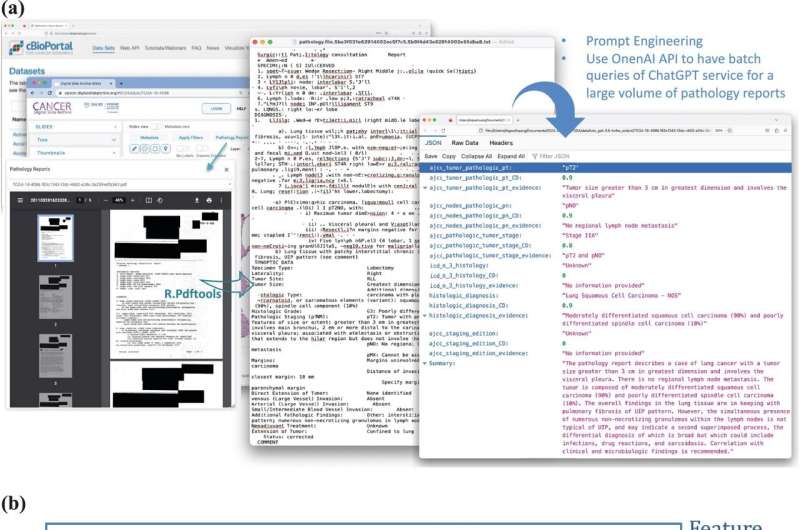
ChatGPT, the artificial intelligence (AI) chatbot designed to assist with language-based tasks, can effectively extract data for research purposes from physicians' clinical notes, UT Southwestern Medical Center researchers report in a new study.
Their findings , published in npj Digital Medicine , could significantly accelerate clinical research and lead to new innovations in computerized clinical decision-making aids.
"By transforming oceans of free-text health care data into structured knowledge, this work paves the way for leveraging artificial intelligence to derive insights, improve clinical decision-making, and ultimately enhance patient outcomes ," said study leader Yang Xie, Ph.D., Professor in the Peter O'Donnell Jr. School of Public Health and the Lyda Hill Department of Bioinformatics at UT Southwestern.
Dr. Xie is also Associate Dean of Data Sciences at UT Southwestern Medical School, Director of the Quantitative Biomedical Research Center, and a member of the Harold C. Simmons Comprehensive Cancer Center.
Much of the research in the Xie Lab focuses on developing and using data science and AI tools to improve biomedical research and health care. She and her colleagues wondered whether ChatGPT might speed the process of analyzing clinical notes—the memos physicians write to document patients' visits, diagnoses, and statuses as part of their medical record—to find relevant data for clinical research and other uses.
Clinical notes are a treasure trove of information, Dr. Xie explained; however, because they are written in free text, extracting structured data typically involves having a trained medical professional read and annotate them. This process requires a huge investment of time and often resources—and can also introduce human bias.
Existing programs that use natural language processing require extensive human annotation and model training. As a result, clinical notes are largely underused for research purposes.
To determine whether ChatGPT could convert clinical notes to structured data, Dr. Xie and her colleagues had it analyze more than 700 sets of pathology notes for lung cancer patients to find the major features of primary tumors, whether lymph nodes were involved, and the cancer stage and subtype.
Overall, Dr. Xie said, the average accuracy of ChatGPT to make these determinations was 89%, based on reviews by human readers.
Their analysis took several weeks of full-time work compared with the few days it took to fine-tune data extraction from the ChatGPT model. This accuracy was significantly better than other traditional natural language processing methods tested for this use.
To test whether this approach is applicable to other diseases, Dr. Xie and her colleagues used ChatGPT to extract information about cancer grade and margin status from 191 clinical notes on patients from Children's Health with osteosarcoma, the most common type of bone cancer in children and adolescents. Here, ChatGPT returned information with nearly 99% accuracy on grade and 100% accuracy on margin status.
Dr. Xie noted that the results were strongly influenced by what prompts ChatGPT was given to perform each task—a phenomenon called prompt engineering. Providing multiple options to choose from, giving examples of appropriate responses, and directing ChatGPT to rely on evidence to draw conclusions improved its performance.
She added that using ChatGPT or other large language models to extract structured data from clinical notes could not only speed clinical research but also help clinical trial enrollment by matching patients' information to clinical trial protocols. However, she said, ChatGPT won't replace the need for human physicians.
"Even though this technology is an extremely promising way to save time and effort, we should always use it with caution. Rigorous and continuous evaluation is very important," Dr. Xie said.
Explore further
Feedback to editors

New analysis estimates the effects of race-neutral lung function testing on patients, hospitals, and beyond
6 hours ago

World-first trial shows benefits of finding and treating undiagnosed asthma and COPD
10 hours ago

Acetaminophen shows promise in warding off acute respiratory distress syndrome, organ injury in patients with sepsis
13 hours ago

Modular communicative leadless ICD found to be safe and exceeds performance expectations
May 18, 2024

Creativity and humor shown to promote well-being in older adults via similar mechanisms

Sweet taste receptor affects how glucose is handled metabolically by humans

Better medical record-keeping needed to fight antibiotic overuse, studies suggest

Repeat COVID-19 vaccinations elicit antibodies that neutralize variants, other viruses

A long-term ketogenic diet accumulates aged cells in normal tissues, new study shows
May 17, 2024

Gut bacteria enhance cancer immunotherapy in mouse study
Related stories.

ChatGPT found to display lower concern for child development 'warning signs' than physicians
May 3, 2024

Study: ChatGPT extracts data for ischemic stroke almost perfectly, is useful for thrombectomy data transfer
Apr 19, 2024

Good evidence confuses ChatGPT when used for health information, study finds
Apr 3, 2024

Study shows ChatGPT can produce medical record notes 10 times faster than doctors without compromising quality
Mar 26, 2024

ChatGPT shows poor performance in answering drug-related questions
Dec 12, 2023

Study shows ChatGPT can be helpful for Black women's self-education about HIV, PrEP
Recommended for you.

Artificial intelligence and the future of surgery

Research team develops new AI tool to help classify brain tumors

Global life expectancy projected to increase by nearly 5 years by 2050 despite various threats
May 16, 2024

AI may improve doctor–patient interactions for older adults with cancer
May 15, 2024

New tool can help surgeons quickly search videos and create interactive feedback
Let us know if there is a problem with our content.
Use this form if you have come across a typo, inaccuracy or would like to send an edit request for the content on this page. For general inquiries, please use our contact form . For general feedback, use the public comments section below (please adhere to guidelines ).
Please select the most appropriate category to facilitate processing of your request
Thank you for taking time to provide your feedback to the editors.
Your feedback is important to us. However, we do not guarantee individual replies due to the high volume of messages.
E-mail the story
Your email address is used only to let the recipient know who sent the email. Neither your address nor the recipient's address will be used for any other purpose. The information you enter will appear in your e-mail message and is not retained by Medical Xpress in any form.
Newsletter sign up
Get weekly and/or daily updates delivered to your inbox. You can unsubscribe at any time and we'll never share your details to third parties.
More information Privacy policy
Donate and enjoy an ad-free experience
We keep our content available to everyone. Consider supporting Science X's mission by getting a premium account.
E-mail newsletter

Wait! Try this Special Offer
Subscribe now and save 15%.
- Facebook . opens in new tab
- Twitter . opens in new tab
- LinkedIn . opens in new tab
- Open Athens/Shibboleth
- Activate Print Subscription
- Create Account
- Renew subscription
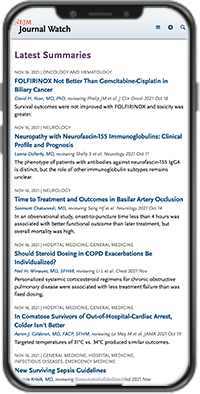
Stay Informed, with Concise, Evidence-Based Information
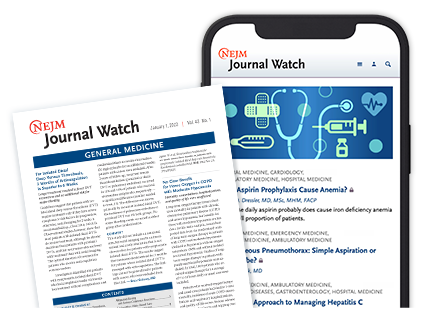
Renew today to continue your uninterrupted access to NEJM Journal Watch.

Stay Informed
Subscribe Or Renew
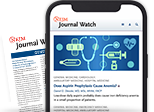
Sign into your account
Forgot Password? Login via Athens or your Institution
Already a print subscriber? Activate your online access.
- SUMMARY AND COMMENT |
- General Medicine
- Ambulatory Medicine
- Hospital Medicine
- May 9, 2024
SGLT-2 Inhibitors in Patients with Stage 5 CKD?
Daniel D. Dressler, MD, MSc, MHM, FACP , reviewing Yen F-S et al. Ann Intern Med 2024 Apr 30
In a retrospective study, patients with severe chronic kidney disease who received SGLT-2 inhibitors had better outcomes than patients who didn't.
Randomized clinical trials have shown that sodium–glucose cotransporter-2 (SGLT-2) inhibitors slow progression of chronic kidney disease (CKD) and need for dialysis (e.g., NEJM JW Gen Med Dec 1 2022 and N Engl J Med 2023; 388:117). Although various guidelines suggest initiating SGLT-2 inhibitors in patients with estimated glomerular filtration rates (eGFR) of ≥20 mL/minute/1.73 m 2 , SGLT-2 inhibitors have not been evaluated in patients with stage 5 CKD (CKD 5; eGFR, ≤15 mL/minute/1.73 m 2 ). Investigators in Taiwan retrospectively assessed 5 years of outcome data for nearly 48,000 patients with type 2 diabetes and CKD 5 — half of patients had newly initiated SGLT-2 inhibitors, and half were not taking these drugs.
Compared with SGLT-2 inhibitor nonusers, users had significantly lower risk for dialysis (adjusted hazard ratio, 0.34) and fewer hospitalizations for heart failure, acute myocardial infarction, diabetic ketoacidosis, and acute kidney injury (aHRs, 0.6–0.8). All-cause mortality was similar in the two groups.
This study was retrospective, with inherent risks for residual confounding, so the authors stop short of recommending that patients with CKD 5 routinely be prescribed SGLT-2 inhibitors. Nevertheless, this first analysis in patients with severe renal disease shows that SGLT-2 inhibitors probably are associated with outcome improvements — including less progression to dialysis. It might pave the way for considering these medications in a broader group of patients with CKD.
Yen F-S et al. Sodium–glucose cotransporter-2 inhibitors and the risk for dialysis and cardiovascular disease in patients with stage 5 chronic kidney disease. Ann Intern Med 2024 Apr 30; [e-pub]. ( https://doi.org/10.7326/M23-1874 )
Facebook | Twitter | LinkedIn | Email | Copy URL
- Disclosures
Disclosures for Daniel D. Dressler, MD, MSc, MHM, FACP, at time of publication
Topics diabetes, latest in general medicine, routine screening for depression in primary care: a randomized trial.
Peter Roy-Byrne, MD Allan S. Brett, MD
A Specific Bacterial Subspecies Is Linked to Colorectal Cancer
Anthony L. Komaroff, MD
- May 7, 2024
GLP-1 Agonists and SGLT-2 Inhibitors Together Have Greater Cardiorenal Benefits
Bruce Soloway, MD
Artificial Intelligence Accurately Identified Tumor Origin in Cancer of Initially Unknown Primary Site
Pneumonia is misdiagnosed often in hospitalized patients.
Aaron J. Calderon, MD, FACP, SFHM
Appropriate Use of IV Albumin: Less Is More
Daniel d. dressler, md, msc, mhm, facp.

Deputy Editor
NEJM Journal Watch General Medicine NEJM Journal Watch Hospital Medicine
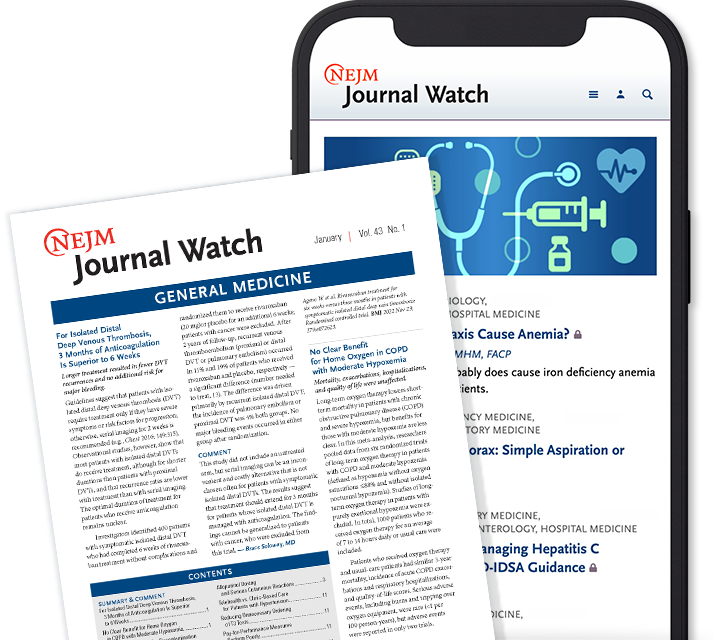
Plus 2 free gifts
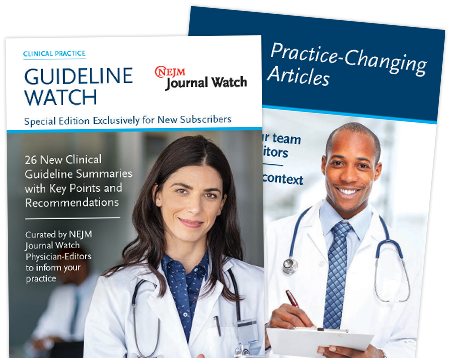
- See us on facebook
- See us on twitter
- See us on youtube
- See us on linkedin
- See us on instagram
Stanford researchers testing ways to improve clinical trial diversity
The American Heart Association has provided funding to two Stanford Medicine professors to develop ways to diversify enrollment in heart disease clinical trials.
June 22, 2022 - By Jennifer Welsh

Hannah Valantine
Two Stanford Medicine professors are working with the Morehouse School of Medicine to test ways to enroll more diverse patients in clinical trials for heart disease treatments. The research is part of a $20 million project launched by the American Heart Association to improve diversity in clinical trials.
“Many common chronic diseases disproportionately affect communities of color,” said Hannah Valantine , MD, a professor of cardiovascular medicine at Stanford Medicine . For example, Black Americans are 30% more likely to die of heart disease than white Americans, according to 2018 data from the U.S. Health and Human Services . “To translate research discoveries into medicines that can make an impact on those communities, we must have diversity in the clinical trials testing them,” she noted.
Valantine and Eldrin Lewis , MD, a professor of cardiovascular medicine and the Simon H. Stertzer, MD, Professor III, will each lead an experimental program. Together, Stanford and Morehouse will receive $4.8 million of this funding — $500,000 for Valantine’s project and $4.3 million for Lewis’.
Clinical trials often do not adequately represent the demographics of the U.S. population: A study of trials between 2006 and 2020 for Food and Drug Administration-approved cardiovascular medications found that less than 3% of participants were Black, although African Americans make up 12.4% of the U.S. population, according to the 2020 census .
The lack of diversity doesn’t just apply to Black patients. Native Hawaiian, Pacific Islander, Filipino and Latin American communities, for example, are also underrepresented in cardiovascular clinical trials. Other AHA grantees are conducting programs to increase participation by these groups in clinical trials.
“For decades, there have been efforts to increase the diversity of clinical trial participants,” said Lewis, chief of the division of cardiovascular medicine. “But despite these efforts, we’ve not moved the needle at all.”

Eldrin Lewis
Overcoming racism and bias
Valantine will lead the Training Researchers to Advance Inclusion Networks (TRAIN) program, which will train a dozen cardiovascular fellows interested in clinical trials on how systemic racism, individual racism and racial bias reduce the participation of non-white patients.
“These same groups of patients who must be included in clinical trials have suffered the brunt of misuse of research — so there is mistrust,” said Valantine, referring to the Tuskegee syphilis study and Henrietta Lacks . “The individual scientist-researcher who’s going to run clinical trials must be aware of these pressures to be ready and equipped to overcome them.”
The program will also teach fellows to engage with diverse communities and lead educational modules to train their colleagues involved in clinical trials. The researchers are hoping to track the effects of this training on the diversity of the clinical trials their fellows are managing. In addition, the TRAIN team plans to roll out the curriculum to the entire network of AHA-funded institutions.
Advancing inclusion efforts
Lewis will lead the Diversity and Inclusion in Cardiovascular through Enrollment and Education Resulting in Sustainable Equity (DIVERSE) network to determine if specific interventions can improve the participation of Black patients as a primary goal. The first arm of the study tests six strategies — including free transportation, artificial intelligence programs to find eligible patients and community outreach.
The DIVERSE network will randomly roll out these interventions nationwide in 112 cardiovascular clinical trials. As a secondary goal of the study, the researchers will analyze the data to determine if the interventions affected other marginalized groups, such as other underrepresented minorities, patients over 65, women, LGBTQ+ participants and those with significant disabilities.
“No one has systematically studied whether any of these methods are effective,” Lewis said. ‘We’ve historically just said, ‘Let’s try it.’ So, we want to answer the question ‘Does it work?’”
In addition to studying interventions, the DIVERSE researchers will work with doctors to understand what prevents their patients from participating in clinical trials. They’ll also seek ways to remove these barriers. The team will compile what they learned from these efforts into an open-access toolkit for community doctors and hospitals.
The fellows participating in the TRAIN curriculum will also be working on the clinical trials implementing the DIVERSE studies’ interventions. They’ll be able to see the effects of these interventions in action and apply their learnings from the program directly to these trials.
“We hope to show that integrated approaches, which involve training on one hand and Dr. Lewis’ interventions on the other, are increasing the diversity of clinical trials,” Valantine said.
The AHA program on the science of diversity in clinical trials was funded with the help of Pfizer and Gates Ventures. The grants support teams of scientists from 11 universities and health care systems. The projects began April 1, 2022, and will continue for four years.
- Jennifer Welsh Jennifer Welsh is a freelance writer
About Stanford Medicine
Stanford Medicine is an integrated academic health system comprising the Stanford School of Medicine and adult and pediatric health care delivery systems. Together, they harness the full potential of biomedicine through collaborative research, education and clinical care for patients. For more information, please visit med.stanford.edu .
Hope amid crisis
Psychiatry’s new frontiers

Suggestions or feedback?
MIT News | Massachusetts Institute of Technology
- Machine learning
- Social justice
- Black holes
- Classes and programs
Departments
- Aeronautics and Astronautics
- Brain and Cognitive Sciences
- Architecture
- Political Science
- Mechanical Engineering
Centers, Labs, & Programs
- Abdul Latif Jameel Poverty Action Lab (J-PAL)
- Picower Institute for Learning and Memory
- Lincoln Laboratory
- School of Architecture + Planning
- School of Engineering
- School of Humanities, Arts, and Social Sciences
- Sloan School of Management
- School of Science
- MIT Schwarzman College of Computing
New treatment could reverse hair loss caused by an autoimmune skin disease
Press contact :, media download.

*Terms of Use:
Images for download on the MIT News office website are made available to non-commercial entities, press and the general public under a Creative Commons Attribution Non-Commercial No Derivatives license . You may not alter the images provided, other than to crop them to size. A credit line must be used when reproducing images; if one is not provided below, credit the images to "MIT."

Previous image Next image
Researchers at MIT, Brigham and Women’s Hospital, and Harvard Medical School have developed a potential new treatment for alopecia areata, an autoimmune disorder that causes hair loss and affects people of all ages, including children.
For most patients with this type of hair loss, there is no effective treatment. The team developed a microneedle patch that can be painlessly applied to the scalp and releases drugs that help to rebalance the immune response at the site, halting the autoimmune attack.
In a study of mice, the researchers found that this treatment allowed hair to regrow and dramatically reduced inflammation at the treatment site, while avoiding systemic immune effects elsewhere in the body. This strategy could also be adapted to treat other autoimmune skin diseases such as vitiligo, atopic dermatitis, and psoriasis, the researchers say.
“This innovative approach marks a paradigm shift. Rather than suppressing the immune system, we’re now focusing on regulating it precisely at the site of antigen encounter to generate immune tolerance,” says Natalie Artzi, a principal research scientist in MIT’s Institute for Medical Engineering and Science, an associate professor of medicine at Harvard Medical School and Brigham and Women’s Hospital, and an associate faculty member at the Wyss Institute of Harvard University.
Artzi and Jamil R. Azzi, an associate professor of medicine at Harvard Medical School and Brigham and Women’s Hospital, are the senior authors of the new study , which appears in the journal Advanced Materials . Nour Younis, a Brigham and Women’s postdoc, and Nuria Puigmal, a Brigham and Women’s postdoc and former MIT research affiliate, are the lead authors of the paper.
The researchers are now working on launching a company to further develop the technology, led by Puigmal, who was recently awarded a Harvard Business School Blavatnik Fellowship.
Direct delivery
Alopecia areata, which affects more than 6 million Americans, occurs when the body’s own T cells attack hair follicles, leading the hair to fall out. The only treatment available to most patients — injections of immunosuppressant steroids into the scalp — is painful and patients often can’t tolerate it.
Some patients with alopecia areata and other autoimmune skin diseases can also be treated with immunosuppressant drugs that are given orally, but these drugs lead to widespread suppression of the immune system, which can have adverse side effects.
“This approach silences the entire immune system, offering relief from inflammation symptoms but leading to frequent recurrences. Moreover, it increases susceptibility to infections, cardiovascular diseases, and cancer,” Artzi says.
A few years ago, at a working group meeting in Washington, Artzi happened to be seated next to Azzi (the seating was alphabetical), an immunologist and transplant physican who was seeking new ways to deliver drugs directly to the skin to treat skin-related diseases.
Their conversation led to a new collaboration, and the two labs joined forces to work on a microneedle patch to deliver drugs to the skin. In 2021, they reported that such a patch can be used to prevent rejection following skin transplant. In the new study, they began applying this approach to autoimmune skin disorders.
“The skin is the only organ in our body that we can see and touch, and yet when it comes to drug delivery to the skin, we revert to systemic administration. We saw great potential in utilizing the microneedle patch to reprogram the immune system locally,” Azzi says.
The microneedle patches used in this study are made from hyaluronic acid crosslinked with polyethylene glycol (PEG), both of which are biocompatible and commonly used in medical applications. With this delivery method, drugs can pass through the tough outer layer of the epidermis, which can’t be penetrated by creams applied to the skin.
“This polymer formulation allows us to create highly durable needles capable of effectively penetrating the skin. Additionally, it gives us the flexibility to incorporate any desired drug,” Artzi says. For this study, the researchers loaded the patches with a combination of the cytokines IL-2 and CCL-22. Together, these immune molecules help to recruit regulatory T cells, which proliferate and help to tamp down inflammation. These cells also help the immune system learn to recognize that hair follicles are not foreign antigens, so that it will stop attacking them.
Hair regrowth
The researchers found that mice treated with this patch every other day for three weeks had many more regulatory T cells present at the site, along with a reduction in inflammation. Hair was able to regrow at those sites, and this growth was maintained for several weeks after the treatment ended. In these mice, there were no changes in the levels of regulatory T cells in the spleen or lymph nodes, suggesting that the treatment affected only the site where the patch was applied.
In another set of experiments, the researchers grafted human skin onto mice with a humanized immune system. In these mice, the microneedle treatment also induced proliferation of regulatory T cells and a reduction in inflammation.
The researchers designed the microneedle patches so that after releasing their drug payload, they can also collect samples that could be used to monitor the progress of the treatment. Hyaluronic acid causes the needles to swell about tenfold after entering the skin, which allows them to absorb interstitial fluid containing biomolecules and immune cells from the skin.
Following patch removal, researchers can analyze samples to measure levels of regulatory T cells and inflammation markers. This could prove valuable for monitoring future patients who may undergo this treatment.
The researchers now plan to further develop this approach for treating alopecia, and to expand into other autoimmune skin diseases.
The research was funded by the Ignite Fund and Shark Tank Fund awards from the Department of Medicine at Brigham and Women’s Hospital.
Share this news article on:
Press mentions, healthday news.
MIT researchers have developed microneedle patches that are capable of restoring hair growth in alopecia areata patients, reports Ernie Mundell for HealthDay . The team’s approach includes a, “patch containing myriad microneedles that is applied to the scalp,” writes Mundell. “It releases drugs to reset the immune system so it stops attacking follicles.”
Previous item Next item
Related Links
- Natalie Artzi
- Institute for Medical Engineering and Science
Related Topics
- Drug delivery
- Health sciences and technology
- Institute for Medical Engineering and Science (IMES)
Related Articles

A sprayable gel could make minimally invasive surgeries simpler and safer

Patch that delivers drug, gene, and light-based therapy to tumor sites shows promising results
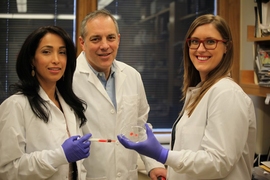
MIT researchers design tailored tissue adhesives
More mit news.

Janabel Xia: Algorithms, dance rhythms, and the drive to succeed
Read full story →

Jonathan Byrnes, MIT Center for Transportation and Logistics senior lecturer and visionary in supply chain management, dies at 75

Researchers develop a detector for continuously monitoring toxic gases

The beauty of biology

Navigating longevity with industry leaders at MIT AgeLab PLAN Forum

Jeong Min Park earns 2024 Schmidt Science Fellowship
- More news on MIT News homepage →
Massachusetts Institute of Technology 77 Massachusetts Avenue, Cambridge, MA, USA
- Map (opens in new window)
- Events (opens in new window)
- People (opens in new window)
- Careers (opens in new window)
- Accessibility
- Social Media Hub
- MIT on Facebook
- MIT on YouTube
- MIT on Instagram
- Intranet Login
- Clinical Services
- Patient Care
- Department Videos
- Job Opportunities
- Diversity and Inclusion
- Administration
- Student Fellows
- Recent Graduates
- Affiliated Hospitals
- Pepper Talk
- Residency Matters
- Roth Report
- Application
- AP/Neuropathology
- Physician-Scientist Pathway
- Conferences
- Teaching Opportunities
- Salary & Benefits
- Living in Philly
- Breast Pathology
- Cellular Therapy
- Clinical Chemistry
- Clinical Informatics
- Clinical Microbiology
- Cytopathology
- GI/Hepatic Pathology
- Hematopathology
- Molecular Genetic Pathology
- Neuropathology
- Soft Tissue/Bone Pathology
- Surgical Pathology
- Transfusion Medicine
- Student Fellowship
- Graduate Studies
- Medical School
- Case Studies
- PennLab Summer Internship
- Cancer and Immunobiology
- Neuropathology and Neurodegeneration
- Diagnostic Innovation
- Info for Investigators
- Research Labs
- Centers and Institutes
- Clinical Cell and Vaccine Production Facility
- CRISPR/Cas9 Mouse Targeting Core
- Penn Cytomics and Cell Sorting Resource Laboratory
- Human Immunology
- Tumor Tissue/ Biospecimen Bank
- Publications
- Electron Microscopy
- Immunohistochemistry
- Medical Pathology
- Clinical Chemistry Core Lab
- Endocrinology
- Coagulation
- Immunology and HLA
- Microbiology
- Point-of-Care Testing
- Reference Testing
- Apheresis Unit
- Flow Cytometry
- Center for Personalized Diagnostics
- Clinical Cancer Cytogenetics Laboratory
- Molecular Pathology
- Rittenhouse Molecular Laboratory
- Test, Biospecimen, & Research Requests
Clinical Assay Development
- Molecular Genetic Pathology Fellowship
- AP Consults
- Immunotherapy
- Meet Your Pathologist
- Making an Appointment
- Clinical Trials
- Patient Resources
REQ RESEARCH EDU
The Division of Precision and Computational Diagnostics (PCD) has a dedicated Research and Development (R&D) team which focuses on new clinical test development and revision/improvement of existing assays. The R&D team oversees test development for all four laboratories (Center for Personalized Diagnostics, Cytogenetics, Molecular Pathology, Rittenhouse Molecular Laboratory) within the PCD. For details on the testing conducted in each laboratory, please refer to the individual laboratory pages and the laboratory test service guide .
New and modified assays are common due to the rapid pace at which relevant molecular and cytogenetic discoveries and their application to clinical testing occurs. There is a formal process to request a new assay or modification to the clinical test menu. To make a request, fill out the New Test Request Form and submit. The development team, along with PCD faculty and operational and administrative staff, review each request. Once a decision has been reached, a formal response will be sent to the requestor. A Steering Committee determines the priority and scope of development work within the division.
New Test Request Form: PCD Clinical Test Development Request (Word doc)
Development Team
Sarah Herlihy, PhD Assistant Director Assay Development
Caren Gentile, MS Research and Development Coordinator
Corey Poveda-Rogers, PhD Genomic Development Specialist
AmandaSue Landi, MS Genomic Development Specialist
Braulio Cappas-Navarro, MPH, MB(ASCP) Genomic Development Specialist
Abhimannyu Rimal, PhD Genomic Development Specialist
Tanashree Kalghatgi, MS Genomic Development Specialist
Kathrine Mcaulay, PhD Molecular Microbiology Development Specialist* *Rittenhouse Molecular Laboratory and Microbiology Laboratory
Laura Cowden, MS Molecular Microbiology Development Specialist* *Rittenhouse Molecular Laboratory and Microbiology Laboratory
Recent Publications
Laczko D, Poveda-Rogers C , Matthews AH, Snaith O, Luger S, Bagg A, Caponetti GC, Morrissette JJD, Yang G. RAD21 mutations in acute myeloid leukemia. Leuk Lymphoma 20:1-7, Mar 2024. doi: 10.1080/10428194.2024.2328233. Epub ahead of print. PMID: 38506144.
Nelson EJ, Gubbiotti MA, Carlin AM, Nasrallah MP, Van Deerlin VM, Herlihy SE . Clinical Evaluation of IDH Mutation Status in Formalin-Fixed Paraffin-Embedded Tissue in Gliomas. Mol Diagn Ther 27(3):371-381, May 2023. doi: 10.1007/s40291-022-00638-7. Epub 2023 Jan 23. PMID: 36690887; PMCID: PMC9870658.
Poveda-Rogers C , Morrissette JJD. Greater expectations: meeting clinical needs through broad and rapid genomic testing. Clin Chem Lab Med 61(4):654-661, Dec 2022. doi: 10.1515/cclm-2022-1016. PMID: 36473133.
El-Sharkawy F, Tang CN , Fitzgerald AS, Khatib LA, Graham-Wooten J, Glaser L, Collman RG, Van Deerlin VM, Herlihy SE . Saliva versus Upper Respiratory Swabs: Equivalent for Severe Acute Respiratory Syndrome Coronavirus 2 University Screening while Saliva Positivity Is Prolonged After Symptom Onset in Coronavirus Disease 2019 Hospitalized Patients. J Mol Diagn 24(7):727-737. doi: 10.1016/j.jmoldx.2022.03.012. Epub 2022 Apr 27. PMID: 35489695; PMCID: PMC9044746.
Herlihy SE and Gentile C . A Penndemic Year in Review. Adv Mol Path 4: 205-216, 2021. doi: 10.1016/j.yamp.2021.06.007.
Recent Abstracts/Presentations
Good AL*, Morgan KM*, Rabut E, Herlihy SE , and Yang G. Incorporation of Parameters to Corroborate Variant Calling by a Proprietary Algorithm for an IDH1/2 PCR Assay. Presented at the Association for Molecular Pathology Annual Meeting, Salt Lake City, UT, 2023.
Good AL, Bigeli A, Gentile C , Priore SF, Van Deerlin VM. Optimizing Interpretive Criteria for Clonality Assessment in T-cell Receptor Gamma Gene Rearrangement Studies by Next-Generation Sequencing. Presented at the Association for Molecular Pathology Annual Meeting, Salt Lake City, UT, 2023.
Herlihy SE , Gentile C , Lieberman D, Milano J, Priore SF, Roth JJ. Establishing a Pathway for Utilization of Clinical Laboratory Resources for Research Studies and Clinical Trials. Presented at the Association for Molecular Pathology Annual Meeting, Salt Lake City, UT, 2023.
Landi A , Chaum M, Rushton C, Gentile C , Roth JJ, Herlihy SE , Priore SF. Technical Considerations and Challenges of Validating a Clinical Anchored Multiplex NGS Based Assay for Known and Novel Fusion Detection in Cancer. Presented at the Association for Molecular Pathology Annual Meeting, Salt Lake City, UT, 2023.
Poveda-Rogers C , Ni V, Corine, J, Morrissette JJD, and Yang G. Features of loss-of-function, SYK-mutated advanced melanoma. Abstract presented at the Association for Molecular Pathology Annual Meeting, Salt Lake City, UT, 2023.
Poveda-Rogers C , Landi A , Chitturi A, Priore SF, Roth JJ, and Herlihy SE . Quality control of a new probe lot for a laboratory developed hybrid capture NGS assay. Abstract presented at the Association for Molecular Pathology Annual Meeting, Salt Lake City, UT, 2023.
Corines J, Ni V, Poveda-Rogers C , Morrissette JJD, and Yang G. CDH1 is an uncommon but recurrent tumor suppressor gene mutated in advanced prostate cancer. Abstract presented at the Association for Molecular Pathology Annual Meeting, Salt Lake City, UT, 2023.
Chitturi, A, Lieberman, DB, Poveda-Rogers C , Roth JJ, Herlihy SE , Morrissette JJD, and Priore SF. Creation of an automated VCF positive control truth set to facilitate quality control review. Abstract presented at the Association for Molecular Pathology Annual Meeting, Salt Lake City, UT, 2023.
Corines J, Bigdeli A, Herlihy SE , Priore SF, Roth JJ. Gene-Specific Validation of Copy Number Gains from a Massively Parallel Sequencing Assay. Abstract presented at the Association for Molecular Pathology Annual Meeting, Phoenix, AZ, 2022.
Rogers-Poveda C, Ngong Tang C, Cowden L, Herlihy SE , Rodino KG. Validation of COVIDSeq: An NGS-Based Assay to Identify SARS-CoV-2 Variants. Abstract presented at the Association for Molecular Pathology Annual Meeting, Phoenix, AZ, 2022.
Validating An Automated, Multiplexed NGS Assay For Rapid Turnaround Time. Corey Poveda-Rogers . Biomarkers Congress; 2022. London, UK.
Attaway CC, Richard-Greenblatt M, El-Sharkawy Navarro F, Herlihy SE, Gentile C, Morris B, Collamn RG, Abella B, Glaser LJ. Comparison of Saliva and NP Swabs for SARS-CoV-2 Detection in an Emergency Department and Ambulatory Testing Locations. Presented at American Society for Clinical Pathology Annual Meeting, Boston, MA, 2021.
Nelson N, Priote SF, Sondermann JN, Herlihy SE , Watt CD. Evaluation of positive control material for MGMT promoter methylation studies. Abstract presented at the Association for Molecular Pathology Annual Meeting, virtual, 2021.
Contact Info
Sarah Herlihy, PhD Assistant Director of Assay Development, PCD Tel: 267-239-6646 s [email protected]
Caren Gentile, MS Research and Development Coordinator, PCD Tel: 215-983-3181 [email protected]
New Test Request Form PCD Clinical Test Development Request (Word doc)
Stay Connected
- Therapeutic Pathology
- Anatomic Pathology
- Lab Medicine Advances
- Science Breakthroughs
Sign up for the Department Newsletter:
Thank you for subscribing!
Department of Pathology and Laboratory Medicine
Perelman School of Medicine at the University of Pennsylvania 3400 Spruce St. Philadelphia, PA 19104-4238
© 2024 Trustees of the University of Pennsylvania
- About This Site

- Frontiers in Chemistry
- Chemical Biology
- Research Topics
Fluorescent Sensors for Biological and Environmental Applications
Total Downloads
Total Views and Downloads
About this Research Topic
The past few decades have witnessed flourishing advancement of fluorescent sensors because of its simple, sensitive, in situ, and real-time monitoring capability in vitro as well as in vivo. Fluorescent sensors are usually based on organic small molecules, nanoparticles, proteins, or their combinations, which comprise a recognition or reaction site for the target analyte and a signaling chromophore for readout of the associated emission changes. Recently, a wide diversity of innovative concepts, strategies and multidisciplinary technologies has been integrated into designing and constructing fluorescent sensors as practical tools for monitoring of various analytes (such as pH, cations, anions, biomolecules and proteins), which have been widely applied in many diverse fields such as biology, physiology, pharmacology, and environmental sciences. This Research Topic intends to provide an academic platform presenting the recent inroads in innovative fluorescent sensors and their applications across a wide range of fields, including basic biological/physiological research, clinical diagnostics, precision medicine, inhibitor screening, drug discovery and efficacy assessment, environmental monitoring and food safety. Our goal is to bring together researchers active in the development of innovative optically activated materials for the advancement of biophotonics. In this topic, we welcome original research, communications, reviews, minireviews and perspectives on themes including, but not limited: •Strategies for Designing of Reaction-Based Fluorescent Sensors •Fluorescence-Based Probes for Tracing Disease Biomarkers •Enzyme Activity-Based Fluorogenic Probes and Their Applications •Fluorogenic Sensors for Biological Reactive Oxygen, Nitrogen, and Sulfur Species •Fluorescent Probes for Environmental Monitoring and Food Safety
Keywords : Fluorescent sensors, fluorescence imaging, applications, semiquantitative analysis, analytes tracing, enzyme activity, disease biomarkers, clinical diagnostics, inhibitor screening, drug discovery, precision medicine, environmental monitoring, food safety
Important Note : All contributions to this Research Topic must be within the scope of the section and journal to which they are submitted, as defined in their mission statements. Frontiers reserves the right to guide an out-of-scope manuscript to a more suitable section or journal at any stage of peer review.
Topic Editors
Topic coordinators, submission deadlines, participating journals.
Manuscripts can be submitted to this Research Topic via the following journals:
total views
- Demographics
No records found
total views article views downloads topic views
Top countries
Top referring sites, about frontiers research topics.
With their unique mixes of varied contributions from Original Research to Review Articles, Research Topics unify the most influential researchers, the latest key findings and historical advances in a hot research area! Find out more on how to host your own Frontiers Research Topic or contribute to one as an author.

IMAGES
VIDEO
COMMENTS
Since 2020, COVID-19 has been a hot-button topic in medicine, along with the long-term symptoms in those with a history of COVID-19. Examples of COVID-19-related research topics worth exploring include: The long-term impact of COVID-19 on cardiac and respiratory health. COVID-19 vaccination rates.
The New England Journal of Medicine (NEJM) is a weekly general medical journal that publishes new medical research and review articles, and editorial opinion on a wide variety of topics of ...
TOPICS. AI in Medicine; Climate Crisis and Health; ... Outpatient-Based Clinical Medicine; P. Pain; Pain Management, Addiction, and End-of-Life Care ... Reproductive Medicine; Research Ethics;
All's Fair in Love and Work. T. AdžemovićN Engl J Med 2024;390:1645-1647. Hounded by questions about her love life, a young physician finds relief in the isolation imposed by the Covid ...
The main challenge ahead in the next two decades will be extracting, collating and mining large sets of natural history data, genomics and all omics analyses, all published clinical studies, RWD ...
PubMed is a comprehensive database of biomedical literature from various sources, including MEDLINE, life science journals, and online books. You can search for citations, access full text content, and explore topics related to health, medicine, and biology. PubMed also provides advanced search options and tools for researchers and clinicians.
Comparative effectiveness of booster vaccines among adults aged ≥50 years. July 25, 2023. Can't find what you're looking for? Continue to all research articles. Original research studies that can improve decision making in clinical medicine, public health, health care policy, medical education, or biomedical research.
Medical research involves research in a wide range of fields, such as biology, chemistry, pharmacology and toxicology with the goal of developing new medicines or medical procedures or improving ...
Recent Advances in Diagnostic and Therapeutic Strategies Driven by Connexin Biology. Andres Tittarelli. Mauricio Antonio Retamal. Fabio Mammano. A multidisciplinary journal which advances our medical knowledge. It supports the translation of scientific advances into new therapies and diagnostic tools that will improve patient care.
A peer-reviewed journal of the Royal College of Physicians, Clinical Medicine (ClinMed) publishes advances in general and specialist medicine and authoritative reviews on thought-provoking topics.It aims to directly improve readers' clinical practice by providing evidence-supported and relevant learning. This will be achieved by publishing original research, guideline summaries and clinically ...
Arrhythmia, cardiomyopathy, heart failure, preventative cardiology and vascular topics research. Heart Institute. Biomechanics research, gait and mobility disorders, swallowing dysfunction research. Department of Physical Medicine and Rehabilitation. Brain tumor, MS, pediatric neurosurgery and transverse myelitis research.
This should improve patient outcomes. Of more than 20,000 research studies published in 2019 in the journals reviewed by the POEMs team, 254 met criteria for validity, relevance, and practice ...
The findings suggest that people can learn to reduce the brain activity causing some types of chronic pain that occur in the absence of injury or persist after healing. 2021 Research Highlights — Basic Research Insights >>. NIH findings with potential for enhancing human health include new drugs and vaccines in development for COVID-19 ...
Clinical laboratory medicine will therefore change its paradigm, ... that will have an impact on the understanding of health and disease and on the progress in basic and applied research in clinical laboratory medicine, taking into consideration papers about all aspects of clinical chemistry and laboratory medicine, with a focus on analytical ...
Topics with large growth. For population research, the eight topics that increased more than two-fold in volume are shown; for clinical research, 27 topics increased more than two-fold and 10 of these are presented; for basic research only two topics had more than a two-fold increase, and the top 8 growers are presented.
Here, we'll explore a variety of healthcare-related research ideas and topic thought-starters across a range of healthcare fields, including allopathic and alternative medicine, dentistry, physical therapy, optometry, pharmacology and public health. NB - This is just the start….
Research Topics | Medicine. Research Topics. The links below will take you to the Research pages for all of the Department of Medicine's different Section and Centers. You can explore more specific research topics within those pages.
This first article in a series describes the history of artificial intelligence in medicine; the use of AI in image analysis, identification of disease outbreaks, and diagnosis; and the use of chat...
At the foundation of Johns Hopkins Medicine is research — from basic research, where scientists study cells and mechanisms, to clinical research that builds on those findings using trials, to translational research that takes information learned from trials to the patient bedside. Browse Research Topics.
22 Paramedic Research Paper Topics. 23 Surgery Research Topics. 24 Radiology Research Paper Topics. 25 Anatomy and Physiology Research Paper Topics. 26 Healthcare Management Research Paper Topics. 27 Medical Ethics Research Paper Topics. 28 Conclusion. In such a complex and broad field as medicine, writing an original and compelling research ...
344. authors. 50. articles. This Research Topic is a collection of 22 review articles covering forefront clinical challenges in pediatric specialties and ranging from Neonatal Intensive Care Unit to General Pediatrics. Each topic is presented with respect to background evidence, clinical relevance and challenges for residents and practitioners ...
It encompasses a wide range of disciplines, from basic science to clinical research, and involves collaboration between scientists, doctors, and other healthcare professionals. In this article, we will explore some exciting new and latest medical research topic ideas that are currently trending in the field. ... Community Medicine Research ...
CAR T-cell therapy clinical trial at UC Davis Health. The new, industry-funded clinical trial with Cabaletta Bio is evaluating CABA-201, an investigational therapy in patients with either SLE or LN who have active disease. UC Davis Health is one of just nine health care institutions worldwide and the only hospital in the Western United States ...
Their findings, published in npj Digital Medicine, could significantly accelerate clinical research and lead to new innovations in computerized clinical decision-making aids. "By transforming ...
Randomized clinical trials have shown that sodium-glucose cotransporter-2 (SGLT-2) inhibitors slow progression of chronic kidney disease (CKD) and need for dialysis (e.g., NEJM JW Gen Med Dec 1 2022 and N Engl J Med 2023; 388:117). Although various guidelines suggest initiating SGLT-2 inhibitors in patients with estimated glomerular filtration rates (eGFR) of ≥20 mL/minute/1.73 m 2, SGLT-2 ...
"To translate research discoveries into medicines that can make an impact on those communities, we must have diversity in the clinical trials testing them," she noted. Valantine and Eldrin Lewis, MD, a professor of cardiovascular medicine and the Simon H. Stertzer, MD, Professor III, will each lead an experimental program. Together ...
S. Ehrmann and OthersN Engl J Med 2023;389:2052-2062. In a randomized trial involving critically ill patients who had undergone mechanical ventilation for 3 days, a 3-day course of inhaled ...
Artzi and Jamil R. Azzi, an associate professor of medicine at Harvard Medical School and Brigham and Women's Hospital, are the senior authors of the new study, which appears in the journal Advanced Materials. Nour Younis, a Brigham and Women's postdoc, and Nuria Puigmal, a Brigham and Women's postdoc and former MIT research affiliate ...
Clinical Evaluation of IDH Mutation Status in Formalin-Fixed Paraffin-Embedded Tissue in Gliomas. Mol Diagn Ther 27(3):371-381, May 2023. doi: 10.1007/s40291-022-00638-7. Epub 2023 Jan 23. PMID: 36690887; PMCID: PMC9870658. Poveda-Rogers C, Morrissette JJD. Greater expectations: meeting clinical needs through broad and rapid genomic testing.
This Research Topic intends to provide an academic platform presenting the recent inroads in innovative fluorescent sensors and their applications across a wide range of fields, including basic biological/physiological research, clinical diagnostics, precision medicine, inhibitor screening, drug discovery and efficacy assessment, environmental ...